Search Result
Results for "
caspase-3 inhibitor
" in MedChemExpress (MCE) Product Catalog:
5
Isotope-Labeled Compounds
| Cat. No. |
Product Name |
Target |
Research Areas |
Chemical Structure |
-
- HY-P1095
-
|
caspase-3 inhibitor VII
|
Caspase
|
Cardiovascular Disease
Neurological Disease
|
|
Ivachtin (Caspase-3 Inhibitor VII; compound 7a) is a nonpeptide, noncompetitive and reversibl caspase-3 inhibitor with an IC50 of 23 nM. Ivachtin has modest selectivity for the remaining caspases .
|
-
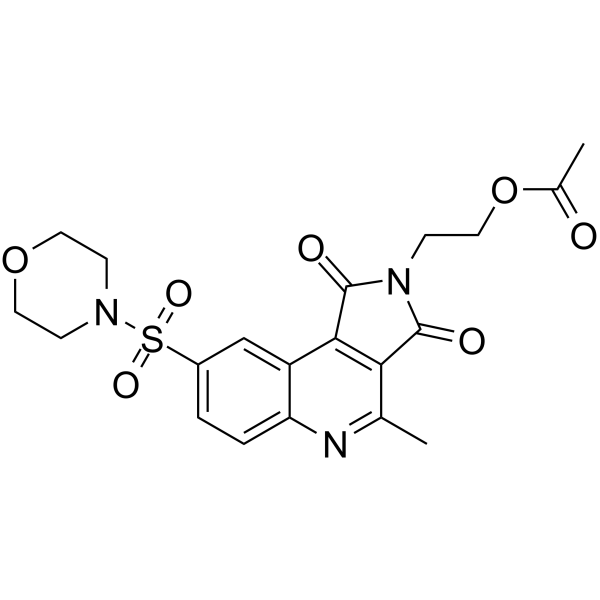
-
- HY-P0034A
-
|
caspase-3 inhibitor III TFA
|
Caspase
Apoptosis
|
Metabolic Disease
|
|
Ac-DEVD-CMK (Caspase-3 Inhibitor III) TFA is a selective and irreversible caspase-3 inhibitor. Ac-DEVD-CMK TFA significantly inhibits apoptosis induced by high levels of glucose or 3,20-dibenzoate (IDB; HY-137295). Ac-DEVD-CMK TFA can be used in a variety of experimental approaches to inhibit apoptosis .
|
-
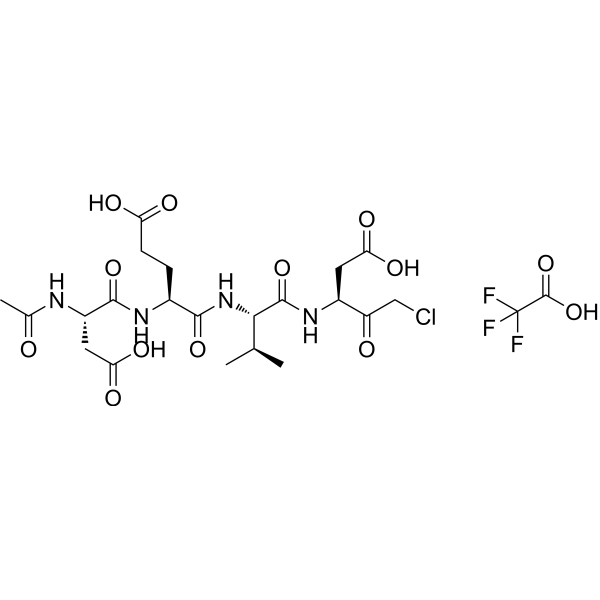
-
- HY-P0034
-
|
caspase-3 inhibitor III
|
|
|
|
Ac-DEVD-CMK (Caspase-3 Inhibitor III) is a selective and irreversible caspase-3 inhibitor. Ac-DEVD-CMK significantly inhibits apoptosis induced by high levels of glucose or 3,20-dibenzoate (IDB; HY-137295). Ac-DEVD-CMK can be used in a variety of experimental approaches to inhibit apoptosis .
|
-
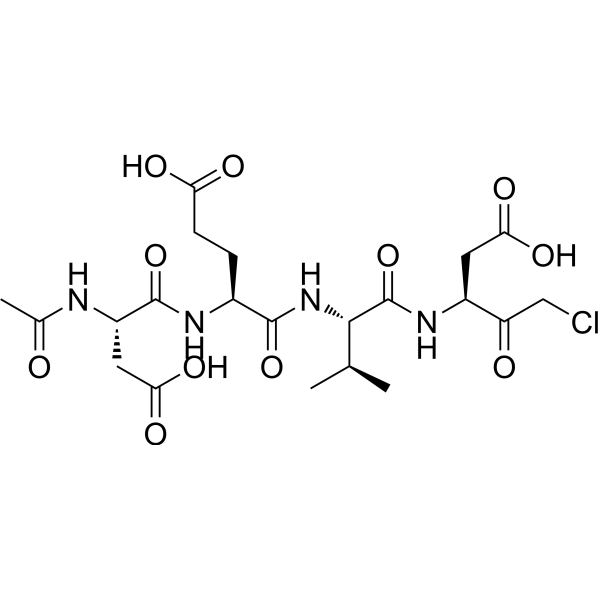
-
- HY-D1432
-
|
|
Fluorescent Dye
|
Cancer
|
|
FITC-C6-DEVD-FMK, a fluorescently labeled caspase-3 inhibitor, can be used for detection of active caspase-3 in mammalian cells undergoing apoptosis. FITC-C6-DEVD-FMK provides a convenient means for sensitive detection of activated caspase-3 in living cells. Z-DEVD-FMK is a specific caspase-3 inhibitor .
|
-
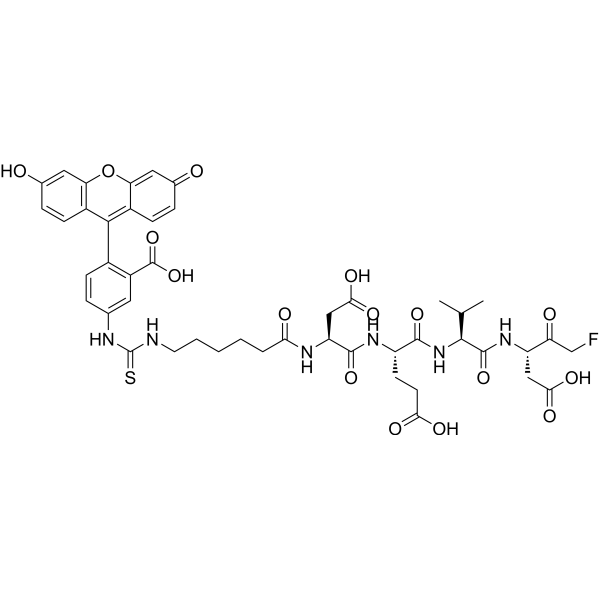
-
- HY-P10162
-
|
|
Caspase
|
Cancer
|
|
Ac-DMQD-AMC is an inhibitor of caspase-3. Ac-DMQD-AMC is an aromatic amine using aminium-based coupling reagent HATU in the presence of 2,4,6-trimethylpyridine (TMP) .
|
-
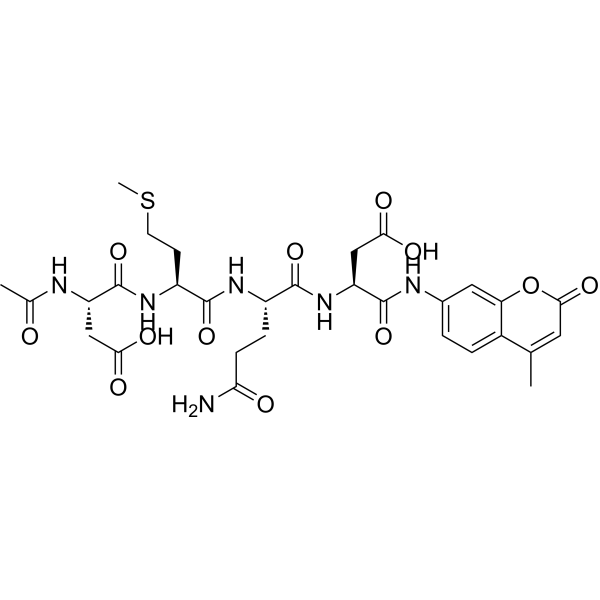
-
- HY-155613
-
|
|
Caspase
|
Cancer
|
|
M867 is a selective and reversible inhibitor of caspase-3 with an IC50 of 1.4 nM and Ki of 0.7 nM. M867 has anti apoptotic activity .
|
-
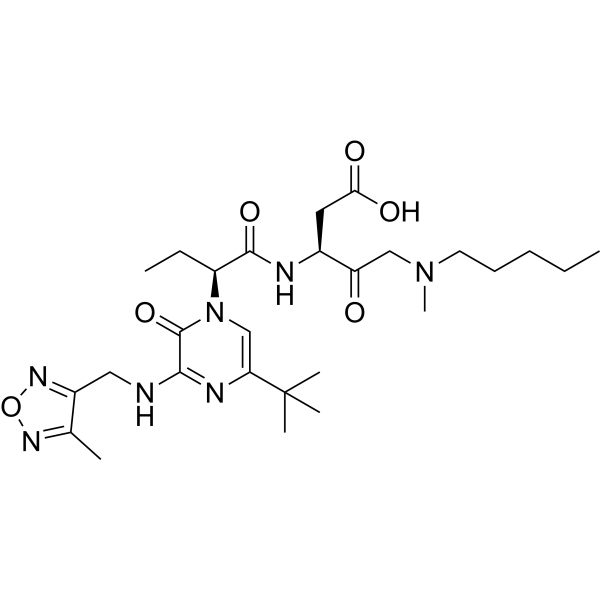
-
- HY-P4900
-
|
|
Caspase
|
Others
|
|
Fluorescein-6-carbonyl-Asp(OMe)-Glu(OMe)-Val-DL-Asp(OMe)-fluoromethylketone is a cell-permeable, non-toxic inhibitor that binds irreversibly to activated caspase-3 in apoptotic cells. The fluorescence intensity can be measured by flow cytometry, microwell plate reader, or fluorescence microscopy .
|
-
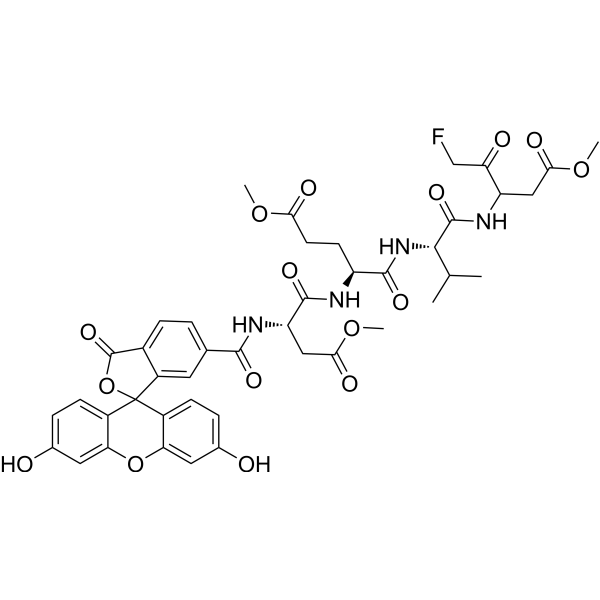
-
- HY-156154
-
|
|
Pyroptosis
|
Cancer
|
|
Caspase-3 activator 1 (compound 4b) is a Ru(III) metal complex that inhibits gastric tumor growth and metastasis. Caspase-3 activator 1 mediates caspase-3 cleavage, which in turn causes Caspase-3 to cleave gasdermin E (GSDME) to produce the GSDME-N terminus, causing gastric tumor cell membrane perforation. Caspase-3 activator 1 is capable of inducing pyroptosis and pyroptosis-induced immune responses and can be assembled with decitabine DCT (HY-A0004) into a 4b-DCT-Lip lipid delivery system .
|
-
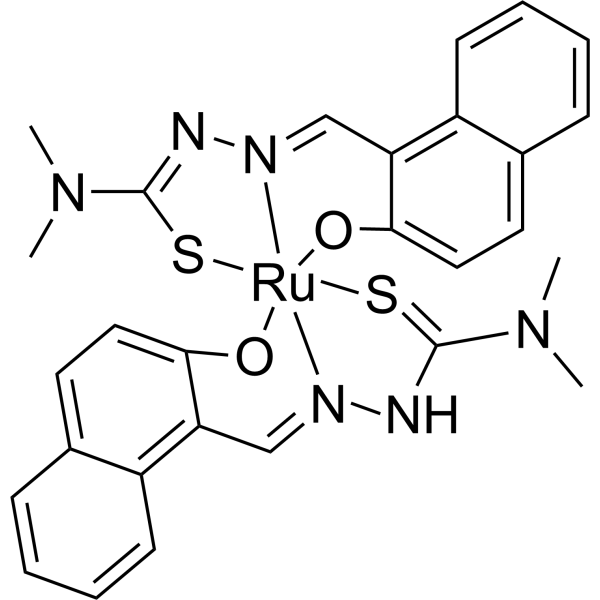
-
- HY-P3234
-
|
|
Casein Kinase
|
Others
|
|
Ac-ESMD-CHO is an inhibitor of caspase-3 and caspase-7. Ac-ESMD-CHO inhibits proteolytic cleavage of the caspase-3 precursor peptide (CPP32) at the Glu-Ser-Met-Asp (ESMD) site .
|
-
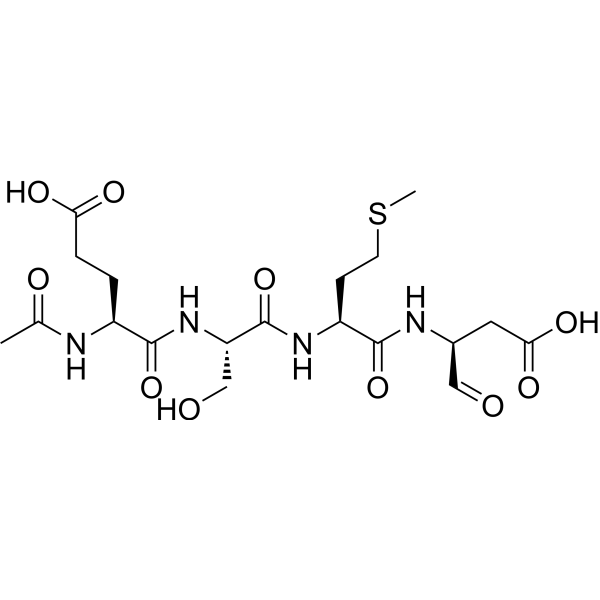
-
- HY-136975
-
-
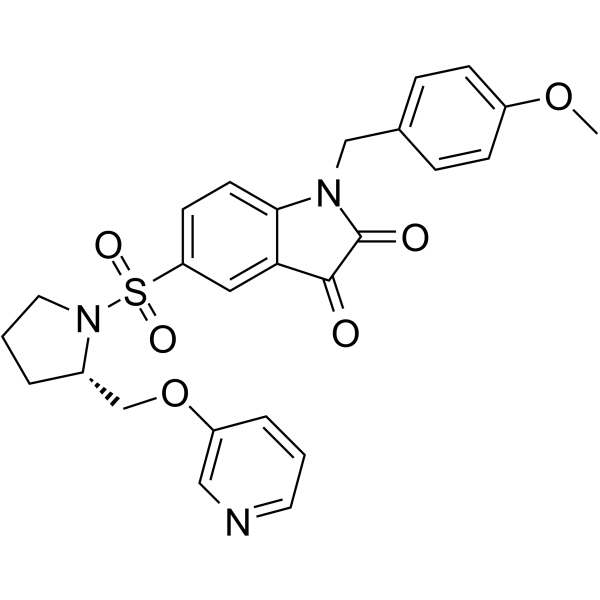
-
- HY-P1001
-
|
|
Caspase
|
Cancer
|
|
Ac-DEVD-CHO is a specific Caspase-3 inhibitor with a Ki value of 230 pM.
|
-
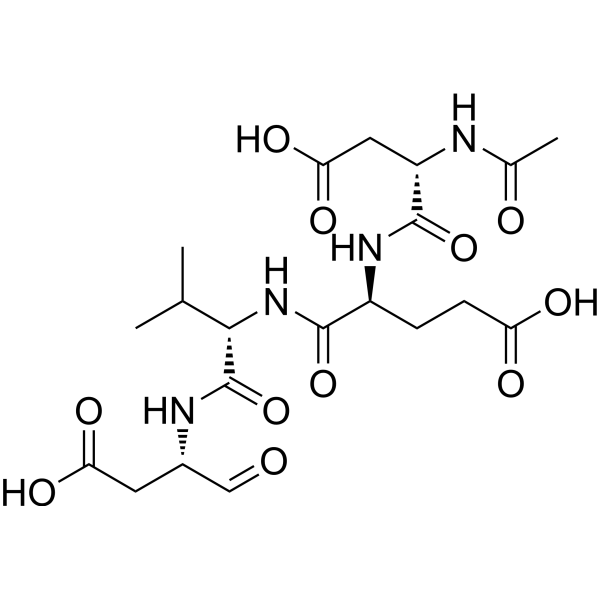
-
- HY-W792412
-
|
|
Caspase
|
Cancer
|
|
Z-YVAD-CMK is a caspase-1 and caspase-3 inhibitor .
|
-
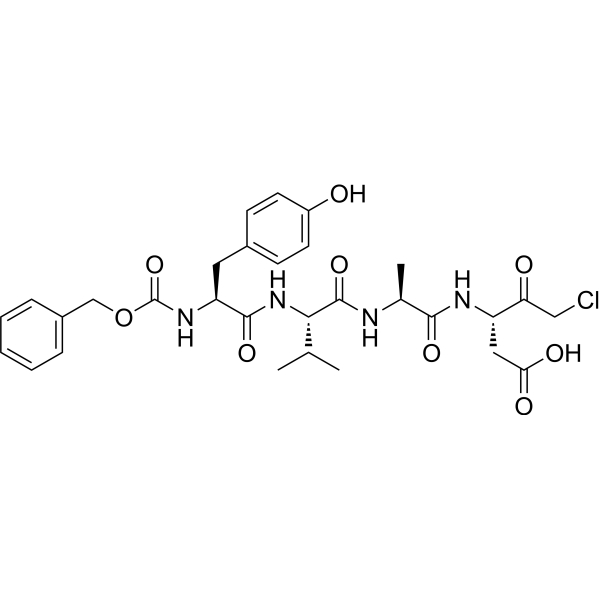
-
- HY-12466
-
Z-DEVD-FMK
Maximum Cited Publications
68 Publications Verification
|
Caspase
|
Cancer
|
|
Z-DEVD-FMK is a specific and irreversible caspase-3 inhibitor with an IC50 of 18 μM .
|
-
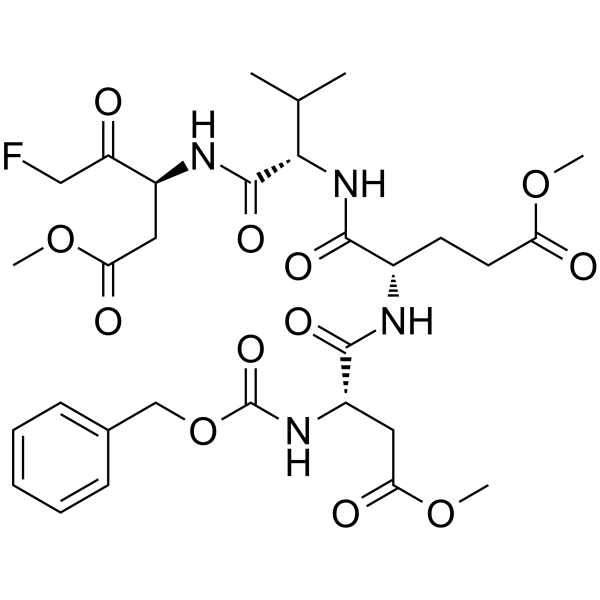
-
- HY-103347
-
|
|
Apoptosis
|
Inflammation/Immunology
|
|
M50054 is a potent inhibitor of apoptosis. M50054 inhibits Etoposide-induced caspase-3 activation of U937 cells with an IC50 of 79 μg/mL. M50054 does not directly inhibit the enzymatic activity of caspase-3. M50054 can be used for the research anti-Fas-antibody-induced hepatitis and chemotherapy-induced alopecia .
|
-
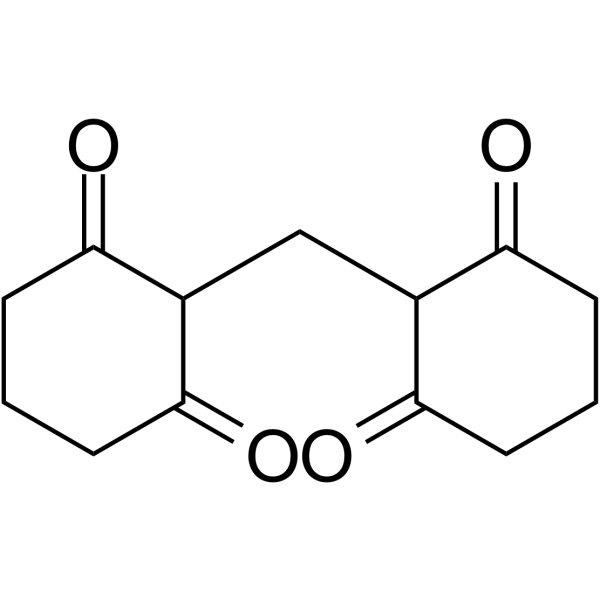
-
- HY-P5936
-
|
DEVD-CHO-CPP 32
|
Caspase
|
Cancer
|
|
Ac-AAVALLPAVLLALLAP-DEVD-CHO (DEVD-CHO-CPP 32) is a potent and reversible caspase-3 inhibitor .
|
-
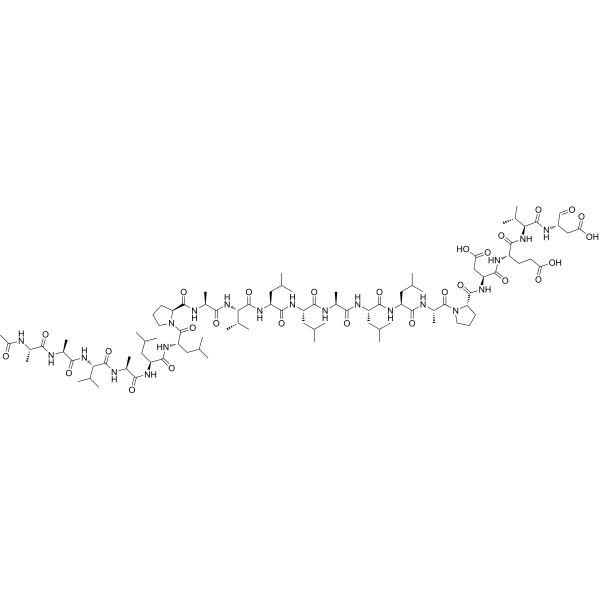
-
- HY-155612
-
|
|
Caspase
|
Neurological Disease
|
|
M826 is a potent, selective and reversible non-peptide caspase-3 inhibitor with an IC50 value of 0.005 μM for enzymatic activity against caspase-3. M826 displays potent anti-apoptotic activity in animal models in vitro and in vivo. M826 can be used for nervous system diseases research .
|
-
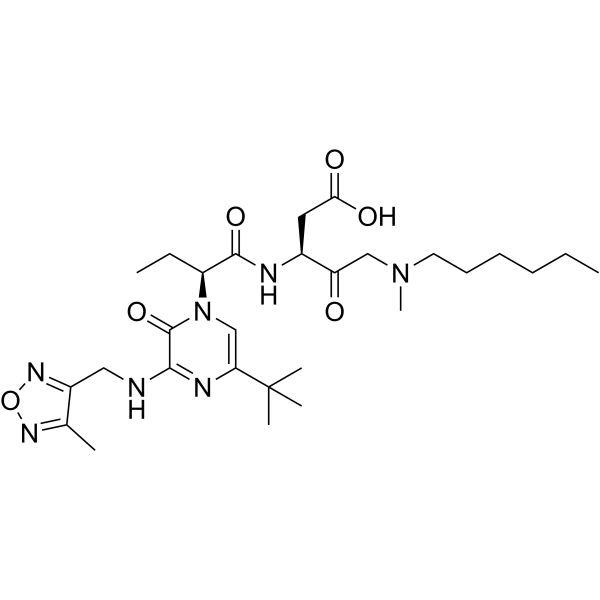
-
- HY-15503
-
|
|
Caspase
CDK
Flavivirus
|
Infection
|
|
PHA-690509 is an anti-ZikV compound that inhibits ZikV replication. PHA-690509 is also a CDK inhibitor, and inhibits caspase-3 activity .
|
-
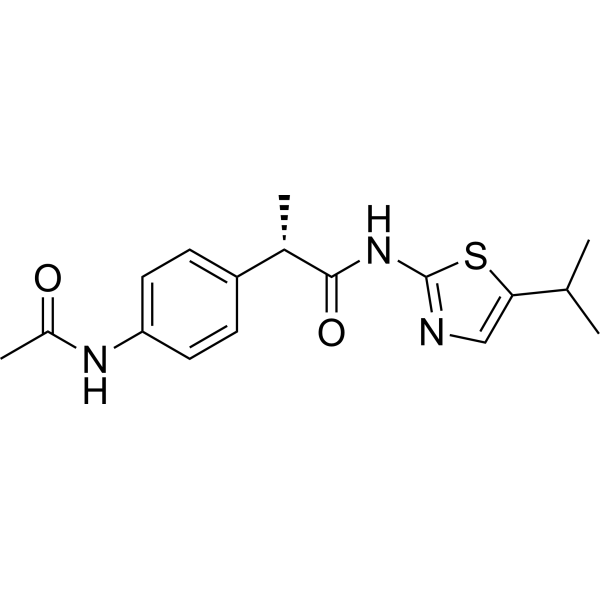
-
- HY-19696
-
|
Tauroursodeoxycholic acid; TUDCA; UR 906
|
ERK
Caspase
Endogenous Metabolite
Apoptosis
|
Cancer
|
|
Tauroursodeoxycholate (Tauroursodeoxycholic acid) is an endoplasmic reticulum (ER) stress inhibitor. Tauroursodeoxycholate significantly reduces expression of apoptosis molecules, such as caspase-3 and caspase-12. Tauroursodeoxycholate also inhibits ERK.
|
-
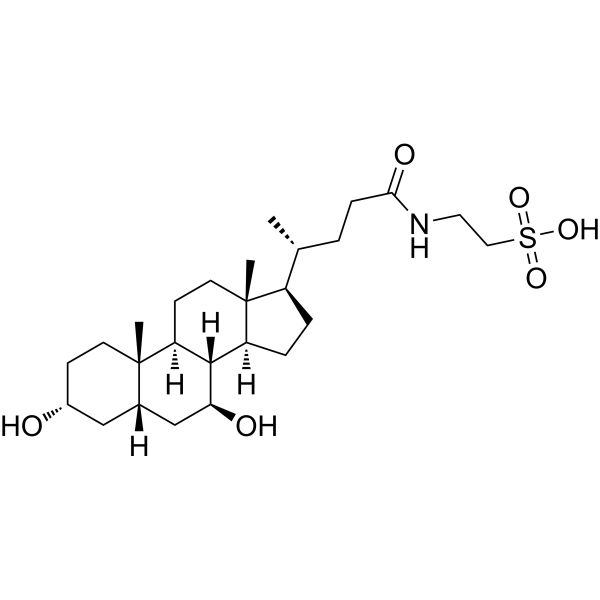
-
- HY-19696A
-
|
Tauroursodeoxycholic acid sodium; TUDCA sodium; UR 906 sodium
|
ERK
Caspase
Apoptosis
Endogenous Metabolite
|
Cancer
|
|
Tauroursodeoxycholate (Tauroursodeoxycholic acid; TUDCA) sodium is an endoplasmic reticulum (ER) stress inhibitor. Tauroursodeoxycholate significantly reduces expression of apoptosis molecules, such as caspase-3 and caspase-12. Tauroursodeoxycholate also inhibits ERK.
|
-
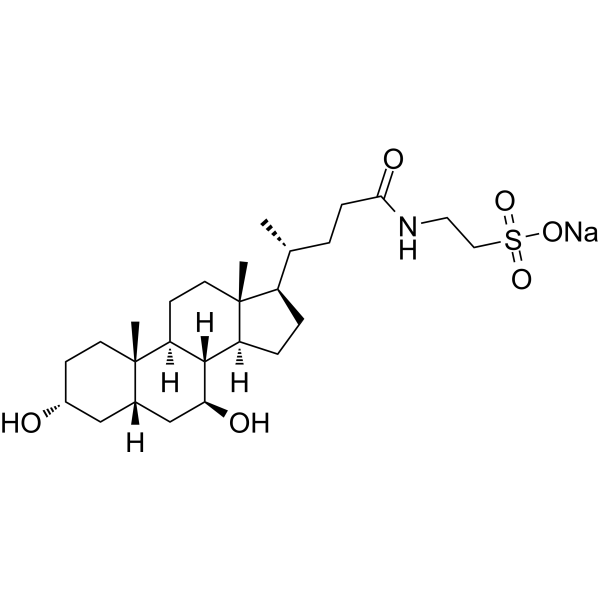
-
- HY-10396
-
|
PF 03491390; IDN-6556
|
Caspase
Flavivirus
|
Infection
Neurological Disease
Cancer
|
|
Emricasan (PF 03491390) is an orally active and irreversible pan-caspase inhibitor. Emricasan inhibits Zika virus (ZIKV)-induced increases in caspase-3 activity and protected human cortical neural progenitors .
|
-
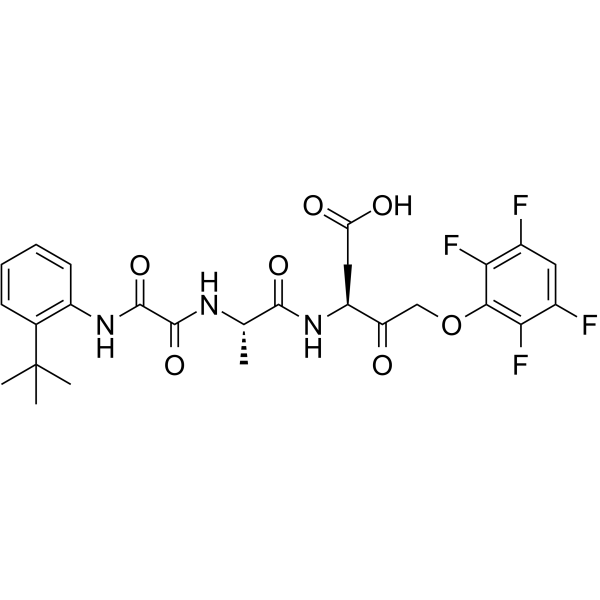
-
- HY-P2228
-
|
|
HDAC
Apoptosis
|
Cancer
|
|
Chlamydocin, a fungal metabolite, is a highly potent HDAC inhibitor, with an IC50 of 1.3 nM. Chlamydocin exhibits potent antiproliferative and anticancer activities. Chlamydocin induces apoptosis by activating caspase-3 .
|
-
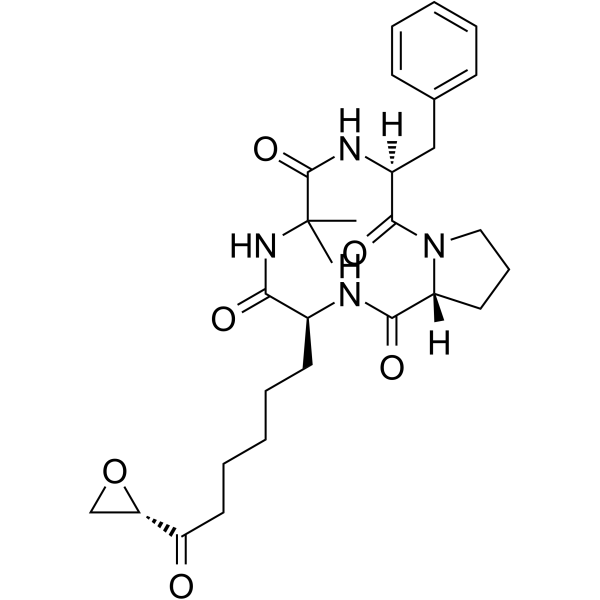
-
- HY-19696B
-
|
Tauroursodeoxycholic acid dihydrate; TUDCA dihydrate; UR 906 dihydrate
|
ERK
Caspase
Apoptosis
Endogenous Metabolite
|
Cancer
|
|
Tauroursodeoxycholate (Tauroursodeoxycholic acid; TDUCA) dihydrate is an endoplasmic reticulum (ER) stress inhibitor. Tauroursodeoxycholate significantly reduces expression of apoptosis molecules, such as caspase-3 and caspase-12. Tauroursodeoxycholate also inhibits ERK .
|
-
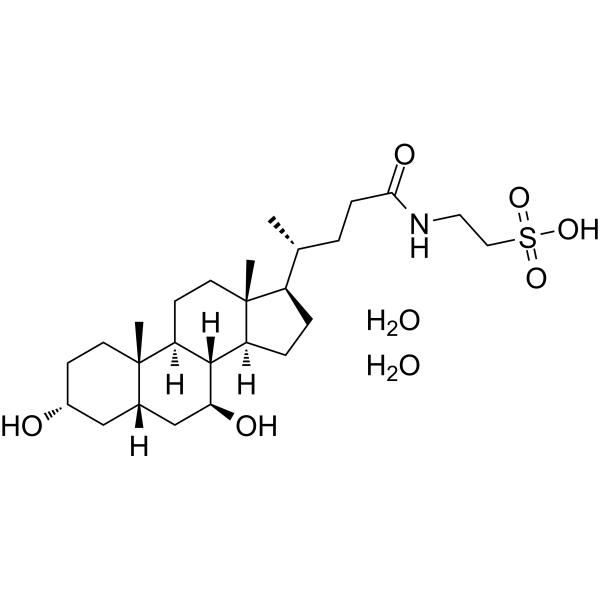
-
- HY-N6681
-
|
|
Caspase
Bacterial
Apoptosis
Antibiotic
|
Infection
|
|
15-acetoxyscirpenol, one of acetoxyscirpenol moiety mycotoxins (ASMs), strongly induces apoptosis and inhibits Jurkat T cell growth in a dose-dependent manner by activating other caspases independent of caspase-3 .
|
-
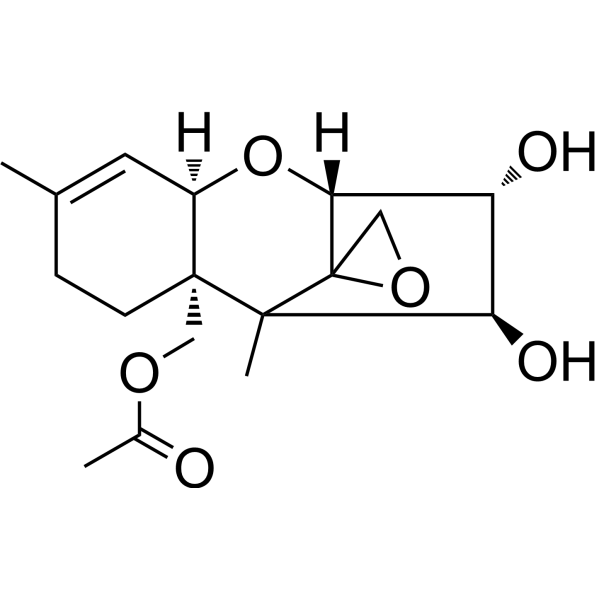
-
- HY-19696S
-
|
|
Isotope-Labeled Compounds
ERK
Caspase
Endogenous Metabolite
Apoptosis
|
Cancer
|
|
Tauroursodeoxycholate-d5 is the deuterium labeled Tauroursodeoxycholate. Tauroursodeoxycholate (Tauroursodeoxycholic acid) is an endoplasmic reticulum (ER) stress inhibitor. Tauroursodeoxycholate significantly reduces expression of apoptosis molecules, such as caspase-3 and caspase-12. Tauroursodeoxycholate also inhibits ERK.
|
-
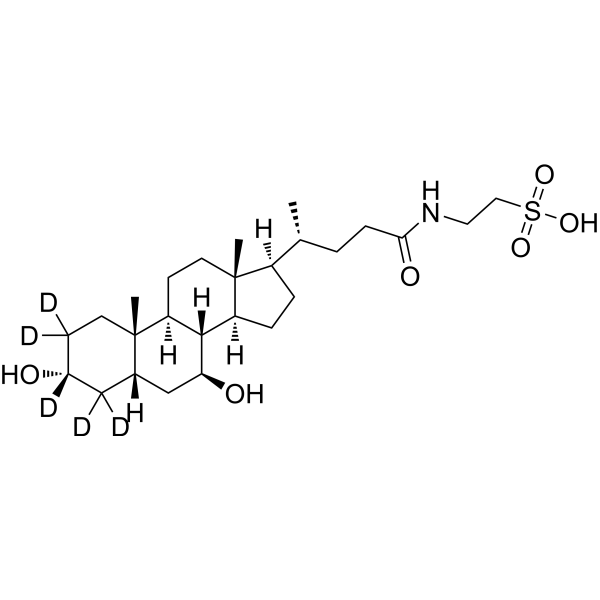
-
- HY-19696S1
-
|
Tauroursodeoxycholic acid-d4; TUDCA-d4; UR 906-d4
|
Isotope-Labeled Compounds
ERK
Caspase
Endogenous Metabolite
Apoptosis
|
Cancer
|
|
Tauroursodeoxycholate-d4 is deuterium labeled Tauroursodeoxycholate. Tauroursodeoxycholate (Tauroursodeoxycholic acid) is an endoplasmic reticulum (ER) stress inhibitor. Tauroursodeoxycholate significantly reduces expression of apoptosis molecules, such as caspase-3 and caspase-12. Tauroursodeoxycholate also inhibits ERK.
|
-
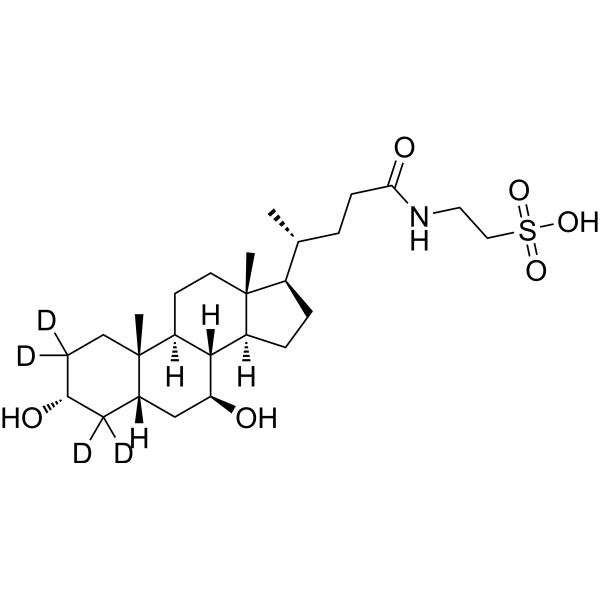
-
- HY-19696AS
-
|
Tauroursodeoxycholic acid-d4 sodium; TUDCA-d4 sodium; UR 906-d4 sodium
|
Isotope-Labeled Compounds
ERK
Caspase
Apoptosis
Endogenous Metabolite
|
Cancer
|
|
Tauroursodeoxycholate-d4 (sodium) is the deuterium labeled Tauroursodeoxycholate sodium. Tauroursodeoxycholate (Tauroursodeoxycholic acid; TUDCA) sodium is an endoplasmic reticulum (ER) stress inhibitor. Tauroursodeoxycholate significantly reduces expression of apoptosis molecules, such as caspase-3 and caspase-12. Tauroursodeoxycholate also inhibits ERK.
|
-
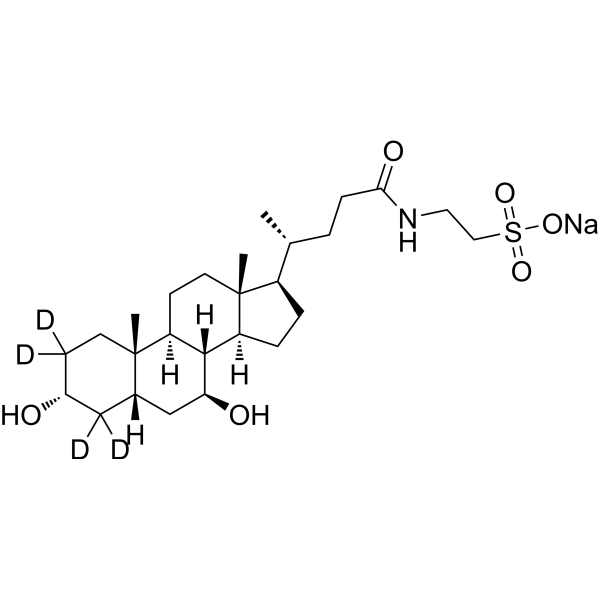
-
- HY-19696S2
-
|
Tauroursodeoxycholic acid-d4-1; TUDCA-d4-1; UR 906-d4-1
|
Isotope-Labeled Compounds
ERK
Caspase
Endogenous Metabolite
Apoptosis
|
|
|
Tauroursodeoxycholate-d4-1 is the deuterium labeled Tauroursodeoxycholate. Tauroursodeoxycholate (Tauroursodeoxycholic acid) is an endoplasmic reticulum (ER) stress inhibitor. Tauroursodeoxycholate significantly reduces expression of apoptosis molecules, such as caspase-3 and caspase-12. Tauroursodeoxycholate also inhibits ERK.
|
-
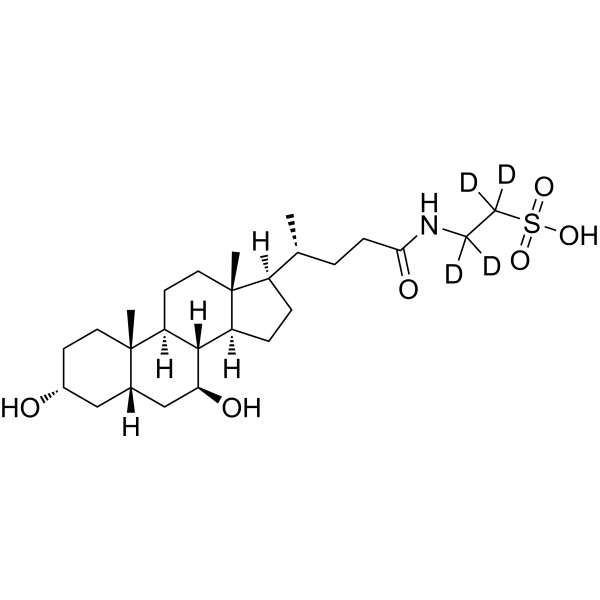
-
- HY-B0621
-
|
CGA89317
|
Parasite
Caspase
Bcl-2 Family
PARP
Pyroptosis
|
Infection
|
|
Triclabendazole is an orally active parasite inhibitor. Triclabendazole has anti-Leishmania activity and induces gasdermin E (GSDME)-dependent pyroptosis by caspase-3 activation. Triclabendazole can be used for the research of fasciola hepatica .
|
-
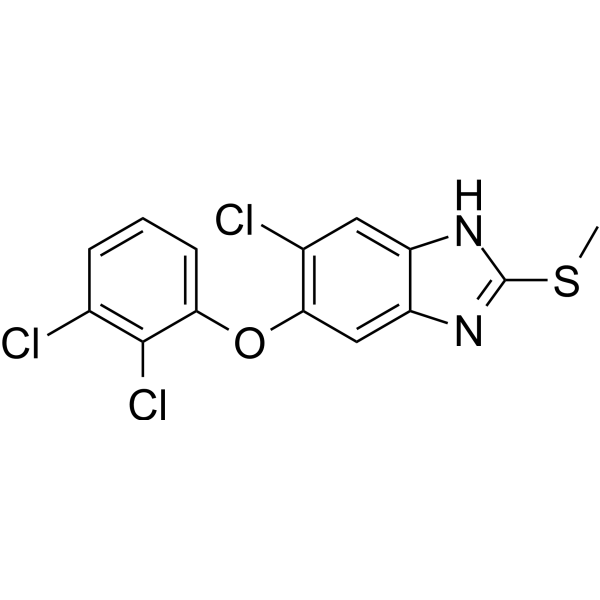
-
- HY-125354
-
|
|
Caspase
|
Cancer
|
|
Limonin glucoside can be isolated from seeds of Citrus reticulata. Limonin glucoside induces activation of caspase-3. Limonin glucoside inhibits the proliferation of human colon adenocarcinoma (SW480) cells (IC50: 37.39 μM) .
|
-
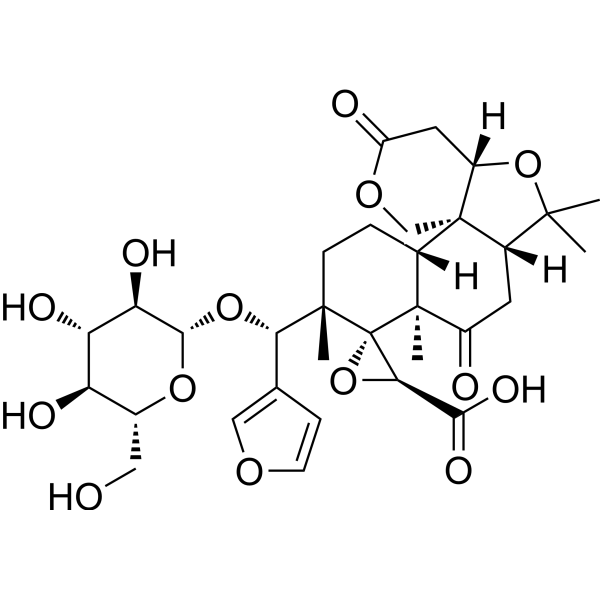
-
- HY-13945
-
NVP 231
2 Publications Verification
|
Apoptosis
|
Cancer
|
|
NVP 231 is a potent, specific, and reversible ceramide kinase (CerK) inhibitor(IC50=12 nM) that competitively inhibits binding of ceramide to CerK . NVP 231 induces cell apoptosis by increasing DNA fragmentation and caspase-3 and caspase-9 cleavage .
|
-
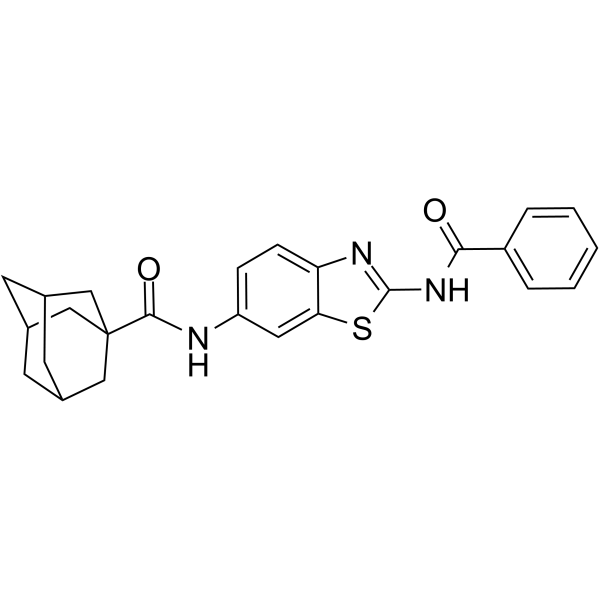
-
- HY-141867
-
|
Z-Phe-Phe-FMK
|
Cathepsin
|
Neurological Disease
|
|
Z-FF-FMK is a selective cathepsin-L inhibitor. Z-FF-FMK can prevent β-amyloid to induce apoptotic changes such as activation of caspase-3, cleavage of the DNA repair enzyme, poly-ADP ribose polymerase, and DNA fragmentation .
|
-
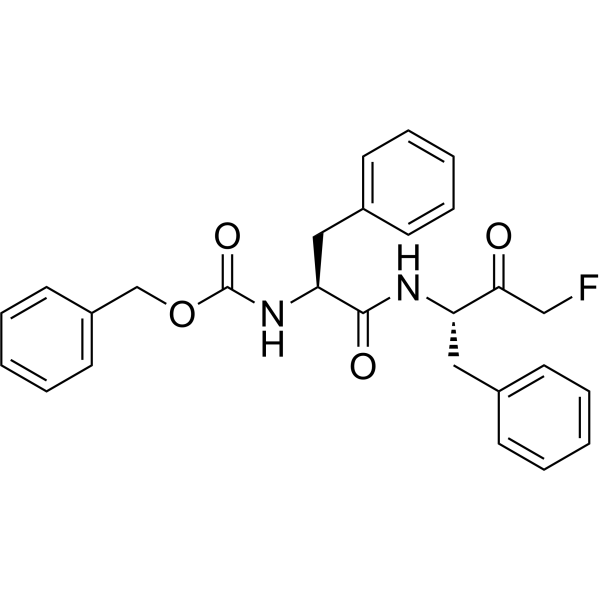
-
- HY-155785
-
|
|
Apoptosis
Autophagy
Reactive Oxygen Species
JAK
|
Cancer
|
|
MTP is a PKM2 inhibitor. MTP induces cancer cell apoptosis by modulating caspase-3 activation. MTP induces autophagy and increases ROS generation. MTP also inhibits JAK2 signaling. MTP can be used for research of oral squamous cell carcinoma .
|
-
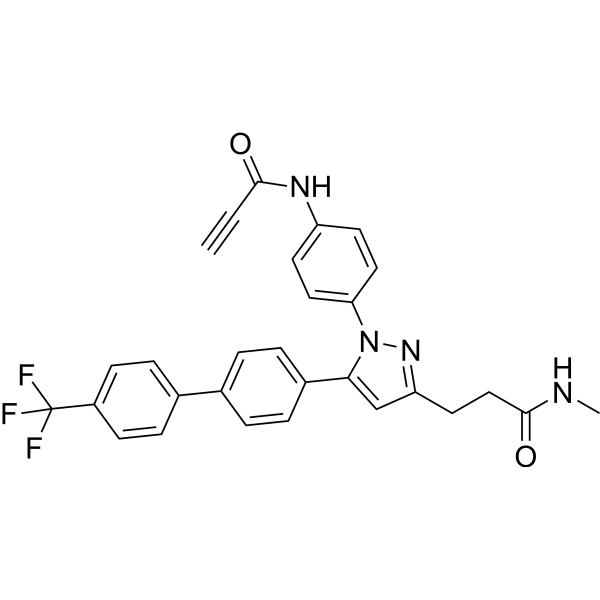
-
- HY-103346
-
|
|
Caspase
Apoptosis
|
Cardiovascular Disease
|
|
MMPSI is a potent and selective small molecule caspase 3 and caspase 7 inhibitor with an IC50 of 1.7 μM for human caspase-3. MMPSI can significantly reduce ischemia-reperfusion-induced infarct size in the isolated rabbit heart, and reduce apoptosis in both the ischemic myocardium and isolated cardiomyocytes. MMPSI can be used for researching cardioprotection .
|
-
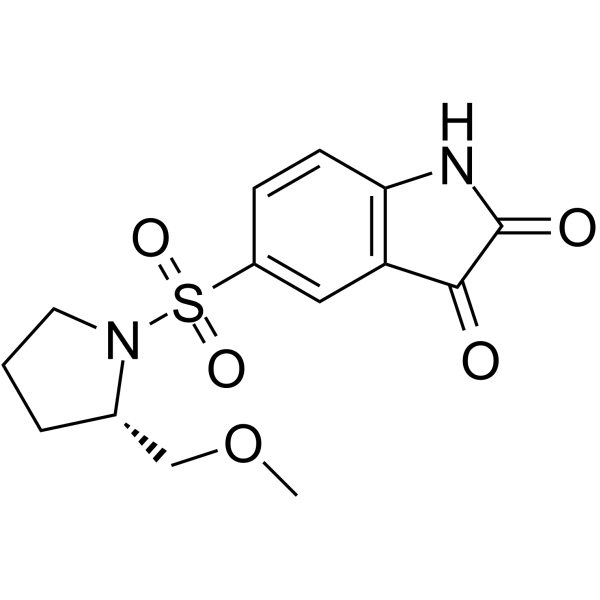
-
- HY-N0809
-
|
|
p38 MAPK
JNK
Caspase
|
Neurological Disease
Metabolic Disease
|
|
Sesaminol, isolated from Sesamum indicum, has antioxidative activity, Sesaminol inhibits lipid peroxidation and shows neuroprotection effect. Sesaminol potently inhibits MAPK cascades by preventing phosphorylation of JNK, p38 MAPKs, and caspase-3 but not ERK-MAPK expression .
|
-
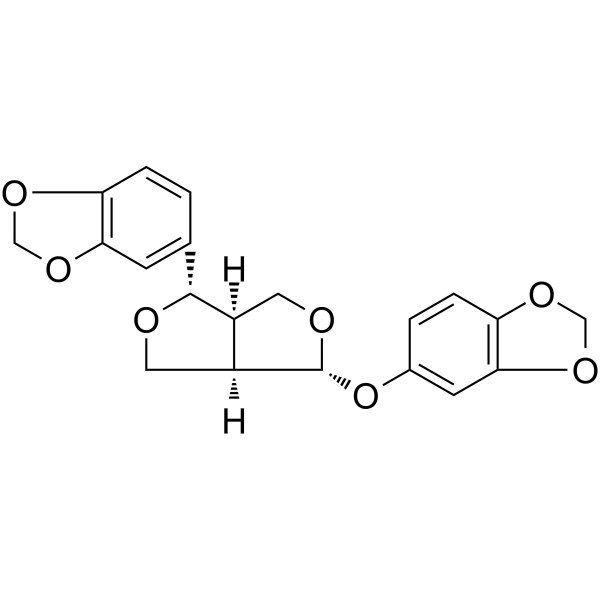
-
- HY-124617A
-
|
|
Apoptosis
|
Inflammation/Immunology
Cancer
|
|
AMXT-1501 tetrahydrochloride is an orally active polyamine transport inhibitor. AMXT1501 blocks tumor growth in immunocompetent mice but not in athymic nude mice lacking T cells . Combination of DFMO and AMXT‐1501 induces caspase‐3 mediated apoptosis in NB cell lines .
|
-
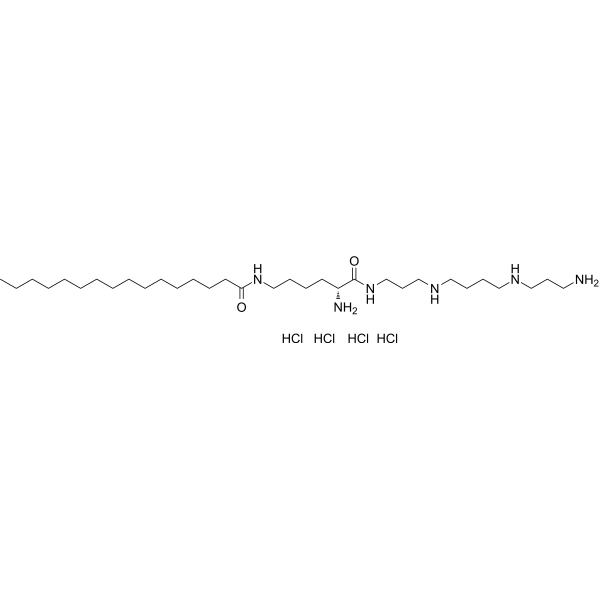
-
- HY-124476
-
|
|
Caspase
Glutaminase
Apoptosis
|
Cancer
|
|
Cystamine is the disulfide form of the free thiol, cysteamine. Cystamine is an orally active transglutaminase (Tgase) inhibitor. Cystamine also has inhibition activity for caspase-3 with an IC50 value of 23.6 μM. Cystamine can be used for the research of severals diseases including Huntington's disease (HD) .
|
-
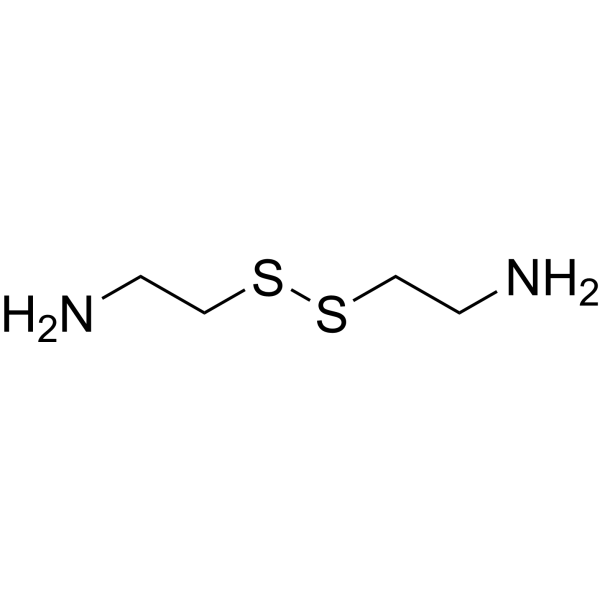
-
- HY-W020050
-
|
|
Caspase
Glutaminase
Apoptosis
|
Neurological Disease
Cancer
|
|
Cystamine (dihydrochloride) is the disulfide form of the free thiol, cysteamine. Cystamine is an orally active transglutaminase (Tgase) inhibitor. Cystamine also has inhibition activity for caspase-3 with an IC50 value of 23.6 μM. Cystamine can be used for the research of severals diseases including Huntington's disease (HD) .
|
-
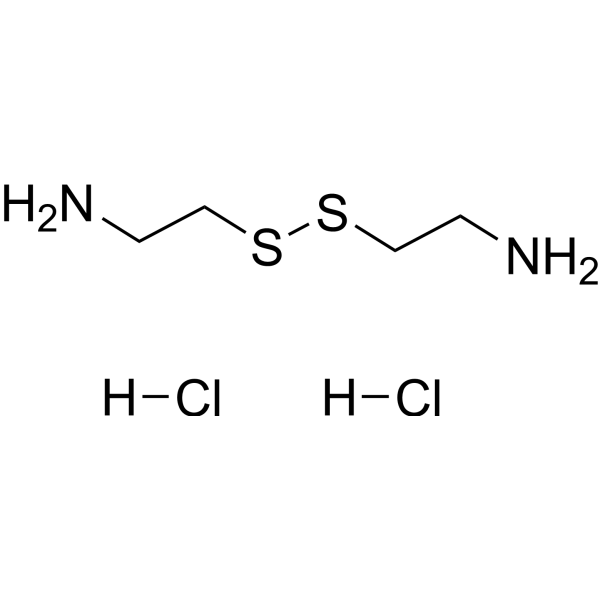
-
- HY-156520
-
|
|
Apoptosis
|
Inflammation/Immunology
|
|
Immunosuppressant-1 (Compound 31) inhibits anti-CD3/anti-CD28 co-stimulated T-cell proliferation. Immunosuppressant-1 has immunosuppressive activity, and induces apoptosis by activating caspase-3 and PARP in activated lymph node cells .
|
-
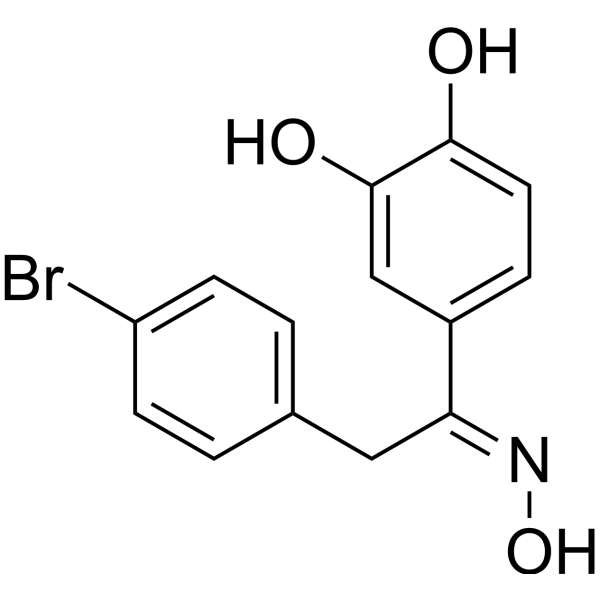
-
- HY-144604
-
|
|
Others
|
Infection
Neurological Disease
|
|
FPR2 agonist 2 is a potent and permeates the blood−brain barrier FPR2 agonist with an EC50 of 0.13 µM, 1.1 µM for FPR2 and FPR1, respectively. FPR2 agonist 2 inhibits the production of pro-inflammatory cytokines, counterbalances the changes in mitochondrial function, and inhibits caspase-3 activity .
|
-
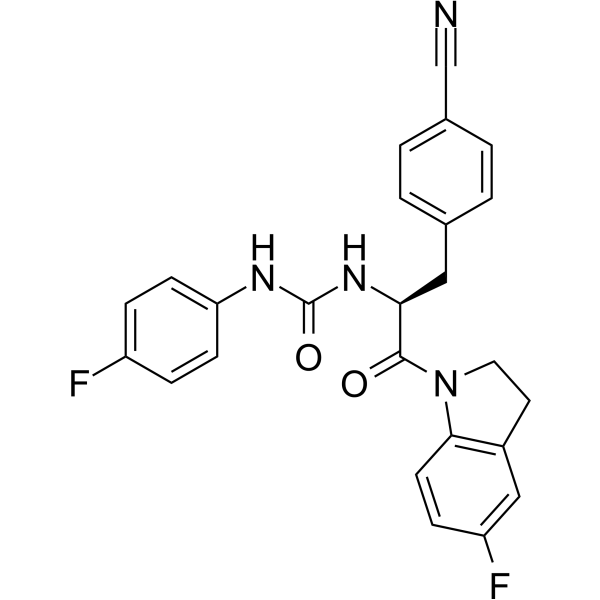
-
- HY-121693
-
|
MDL101114ZA free base
|
VDAC
RAD51
|
Cancer
|
|
DIDS is a dual inhibitor of ABCA1 and VDAC1. DIDS also inhibits RAD51, inhibiting RAD51-mediated homologous pairing and strand exchange reactions. DIDS inhibits anion exchange and binding to red blood cell membranes, inhibits the activation of caspase-3 and -9, and can be used in cancer research .
|
-
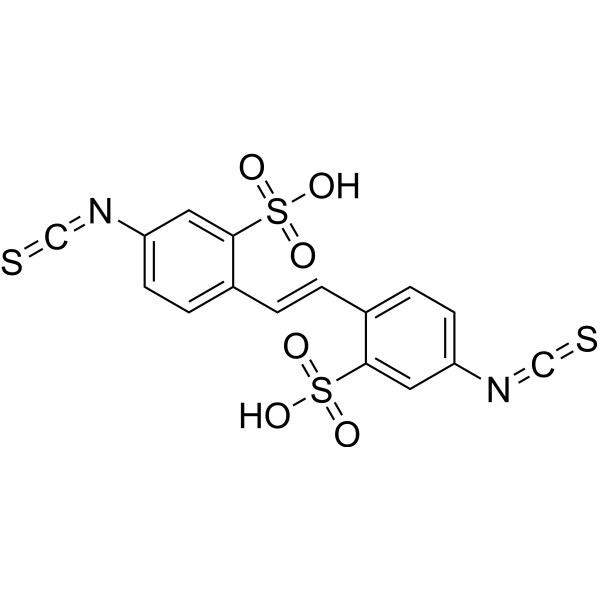
-
- HY-Y0152
-
|
(8R,9S)-Cinchonine; LA40221
|
Apoptosis
Parasite
Autophagy
Caspase
Calcium Channel
|
Others
Inflammation/Immunology
Cancer
|
|
Cinchonine is a natural compound present in Cinchona bark with antimalarial, antitumor, anti-inflammatory, anti platelet-aggregation and anti-obesity properties. Cinchonine inhibits cells proliferation and autophagy and induces apoptosis through activation of Caspase-3. Cinchonine activates endoplasmic reticulum stress-induced apoptosis in human liver cancer cells .
|
-
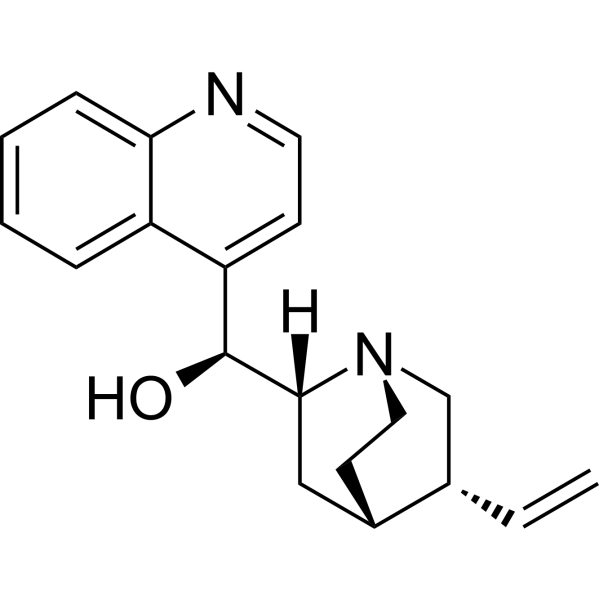
-
- HY-114095
-
-
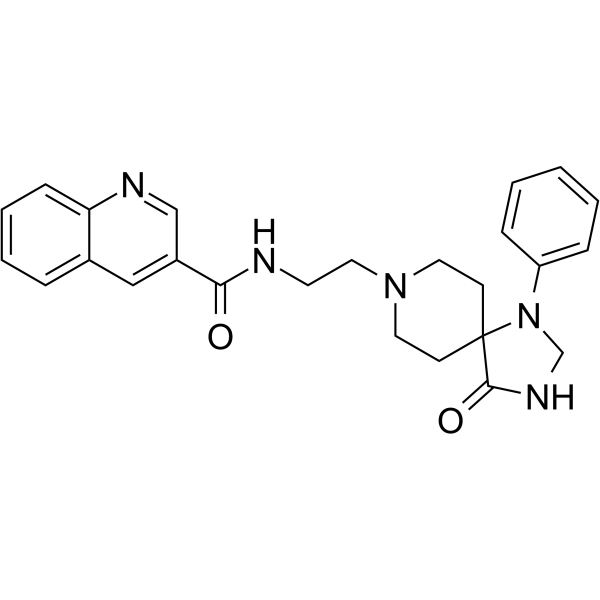
-
- HY-111675
-
|
|
Caspase
Pyroptosis
|
Inflammation/Immunology
|
|
Ac-FLTD-CMK, a gasdermin D (GSDMD)-derived inhibitor, is a specific inflammatory caspases inhibitor. Ac-FLTD-CMK is effective against caspases-1 (IC50 of 46.7 nM), caspases-4 (IC50 of 1.49 μM), caspases-5 (IC50 of 329 nM), and caspases-11 , but not the apoptotic caspases such as caspase-3 .
|
-
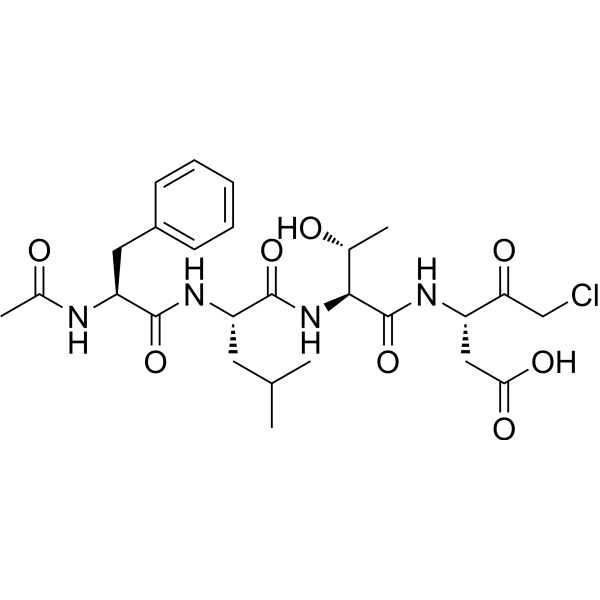
-
- HY-129119
-
|
|
Akt
Caspase
|
Cancer
|
|
Akt1/Akt2-IN-2 (compound 7) is an allosteric dual Akt1 and Akt2 inhibitor (IC50=138 nM and 212 nM, respectively). Akt1/Akt2-IN-2 increases activity of caspase-3, and inhibits viability of a number of tumor cells .
|
-
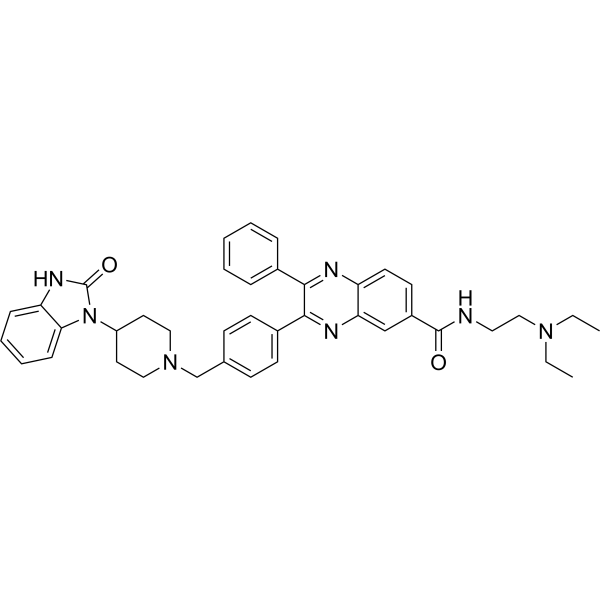
-
- HY-W748591
-
|
|
Apoptosis
Amyloid-β
|
Cancer
|
|
Cannflavin A can be isolated from Cannabis sativa L. Cannflavin A has anti-cancer, neuroprotective and anti-inflammatory activity. Cannflavin A inhibits Aβ1-42 aggregation. Cannflavin A also inhibits kynurenine-3-monooxygenase (KMO). Cannflavin A activates apoptosis via caspase-3 cleavage .
|
-
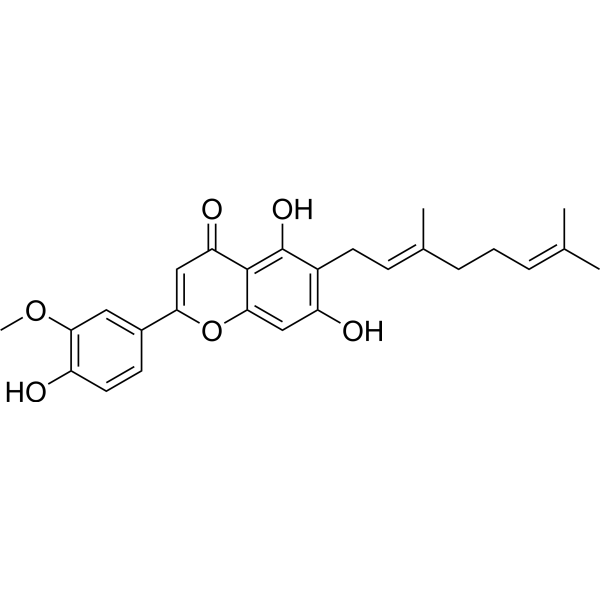
-
- HY-D0086
-
|
MDL101114ZA
|
VDAC
RAD51
|
Cancer
|
|
DIDS sodium salt (MDL101114ZA) is a dual inhibitor of ABCA1 and VDAC1. DIDS also inhibits RAD51, inhibiting RAD51-mediated homologous pairing and strand exchange reactions. DIDS inhibits anion exchange and binding to red blood cell membranes, inhibits the activation of caspase-3 and -9, and can be used in cancer research .
|
-
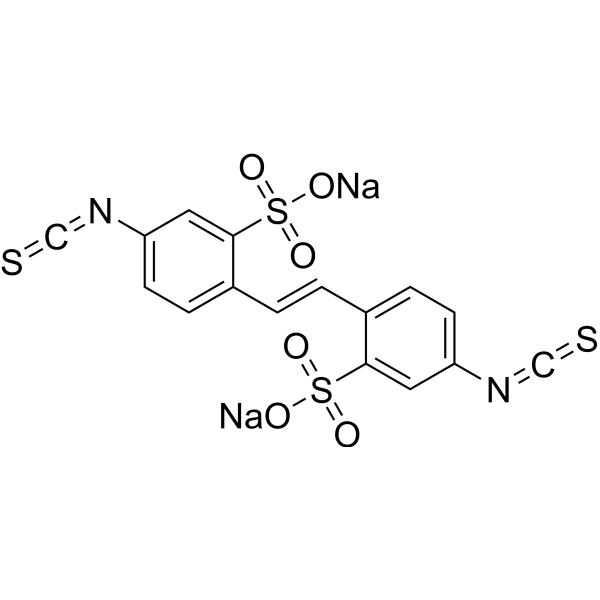
-
- HY-114372
-
|
|
Lipoxygenase
Caspase
Apoptosis
|
Cancer
|
|
Lycopodine, a pharmacologically important bioactive component derived from Lycopodium clavatumspores, triggers apoptosis by modulating 5-lipoxygenase, and depolarizing mitochondrial membrane potential in refractory prostate cancer cells without modulating p53 activity . Lycopodine inhibits proliferation of HeLa cells through induction of apoptosis via caspase-3 activation .
|
-
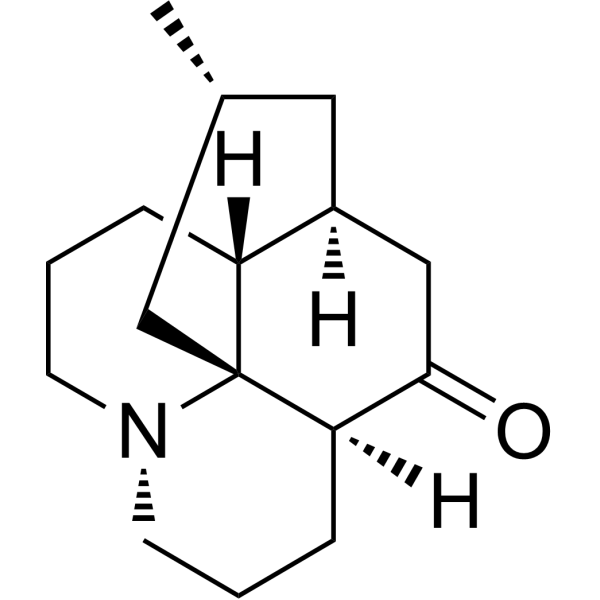
-
- HY-12352
-
|
|
STAT
Apoptosis
|
Cancer
|
|
HJC0416 is a potent and orally active STAT3 inhibitor. HJC0416 shows antiprolifeative activity and induces apoptosis. HJC0416 decreases the expression of p-STAT3 (Tyr-705), Cyclin D1 and increases the expression of cleaved caspase-3 protein. HJC0416 shows anti-tumor activity .
|
-
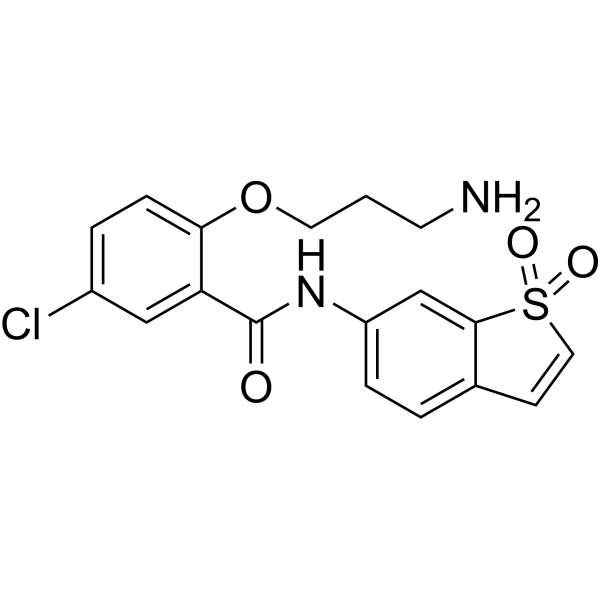
-
- HY-157546
-
-
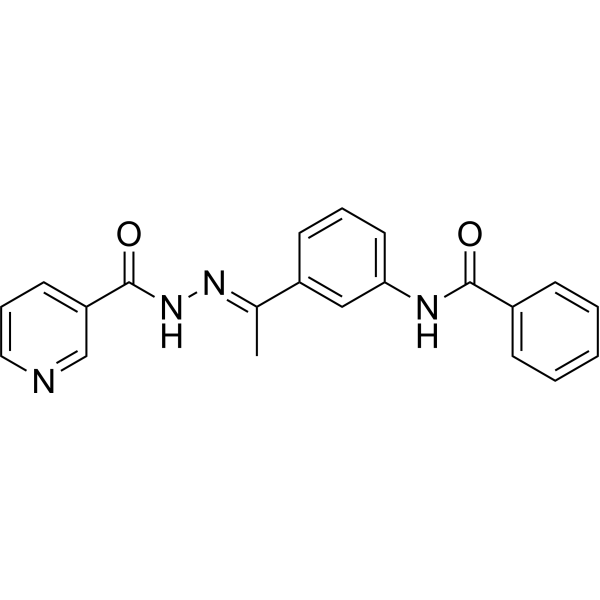
-
- HY-108312A
-
|
|
Caspase
|
Neurological Disease
|
|
AC-VEID-CHO (TFA) is a peptide-derived caspase inhibitor and has potency of inhibition for Caspase-6, Caspase-3 and Caspase-7 with IC50 values of 16.2 nM, 13.6 nM and 162.1 nM, respectively. AC-VEID-CHO (TFA) can be used for the research of neurodegenerative conditions including Alzheimer’s and Huntington’s disease .
|
-
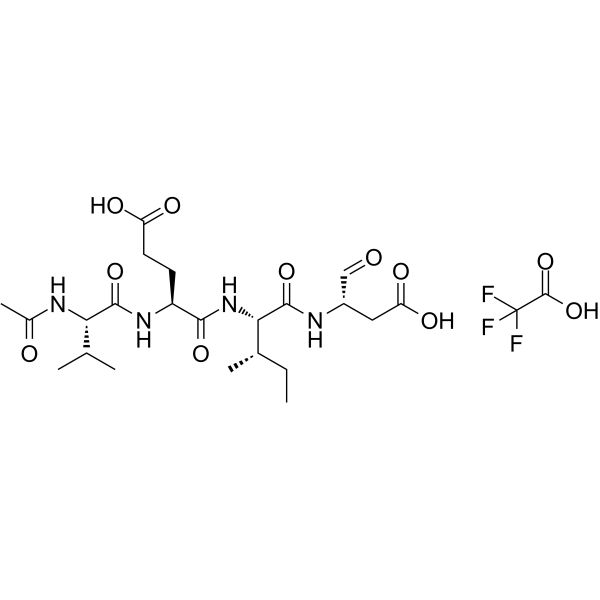
- HY-W046353
-
|
o-Methoxycinnamaldehyde
|
Apoptosis
|
Cancer
|
|
2-Methoxycinnamaldehyde (o-Methoxycinnamaldehyde) is a natural compound of Cinnamomum cassia, with antitumor activity . 2-Methoxycinnamaldehyde inhibits proliferation and induces apoptosis by mitochondrial membrane potential (ΔΨm) loss, activation of both caspase-3 and caspase-9 . 2-Methoxycinnamaldehyde effectively inhibits platelet-derived growth factor (PDGF)-induced HASMC migration .
|
-
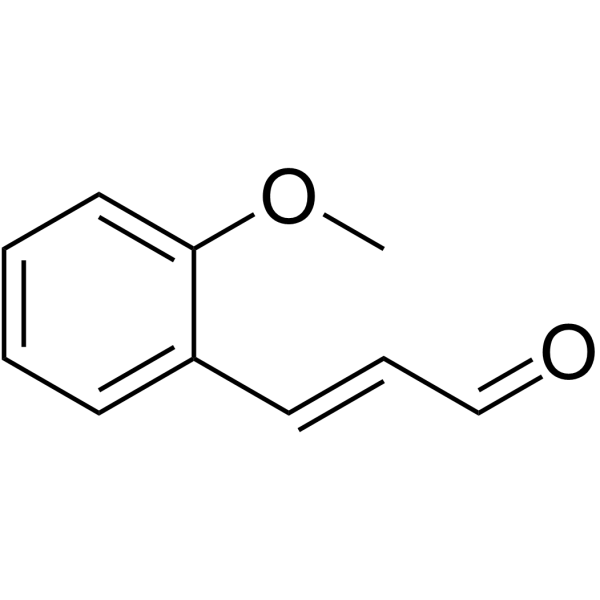
- HY-155807
-
|
|
STAT
JAK
Apoptosis
|
Cancer
|
|
DPP is a Platinum(IV) complex, bearing pterostilbene-derived axial ligand. DPP inhibit the JAK2-STAT3 pathway in breast cancer (BC) cells with antiproliferative activity, and activates caspase-3 and cleaved poly ADP-ribose polymerase to induces apoptosis. DPP promotes the maturation and antigen presentation of dendritic cells, and exhibits in vivo safety .
|
-
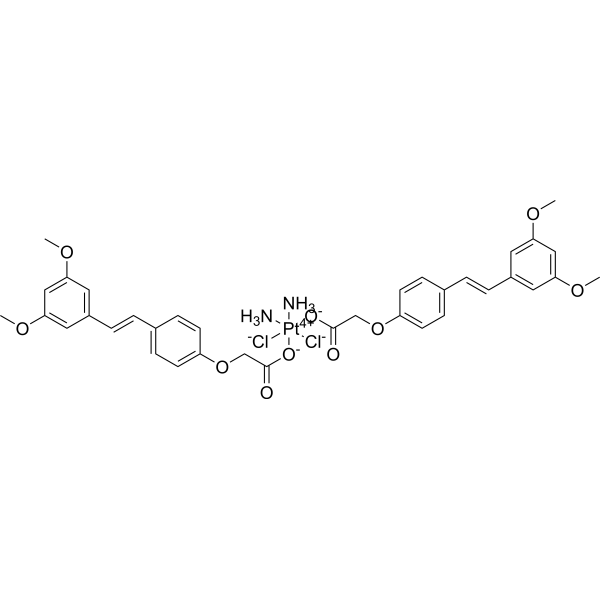
- HY-W748509
-
|
|
Caspase
Apoptosis
|
Cancer
|
|
Pipernonaline is a piperine derivative with antiprostate cancer activity. Pipernonaline inhibits the proliferation of androgen-dependent/independent LNCaP/PC-3 prostate cells. Pipernonaline activates caspase-3 and promotes procaspase-3/PARP cleavage. Pipernonaline also mediates reactive oxygen species (ROS) production, increased intracellular Ca(2+), and mitochondrial membrane depolarization .
|
-
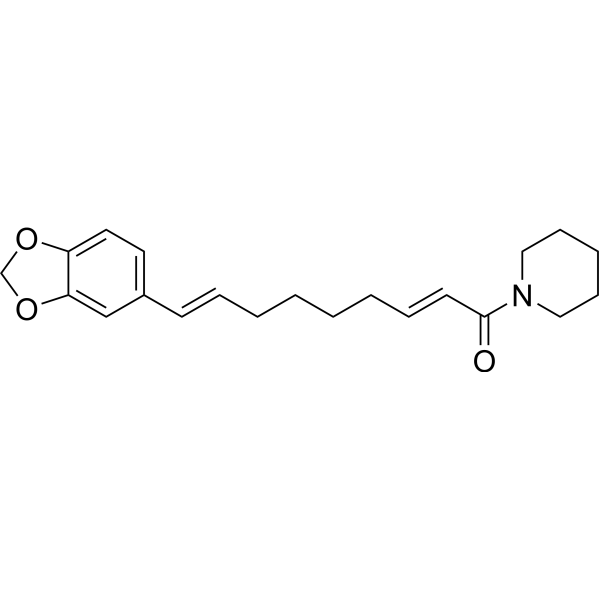
- HY-122611
-
|
|
Androgen Receptor
Apoptosis
|
Cancer
|
|
CSRM617 is a selective small-molecule inhibitor of the transcription factor ONECUT2 (OC2, a master regulator of androgen receptor) with a Kd of 7.43 uM in SPR assays, binding to OC2-HOX domain directly. CSRM617 induces apoptosis by appearance of cleaved Caspase-3 and PARP. CSRM617 is well tolerated in the prostate cancer mouse model
|
-
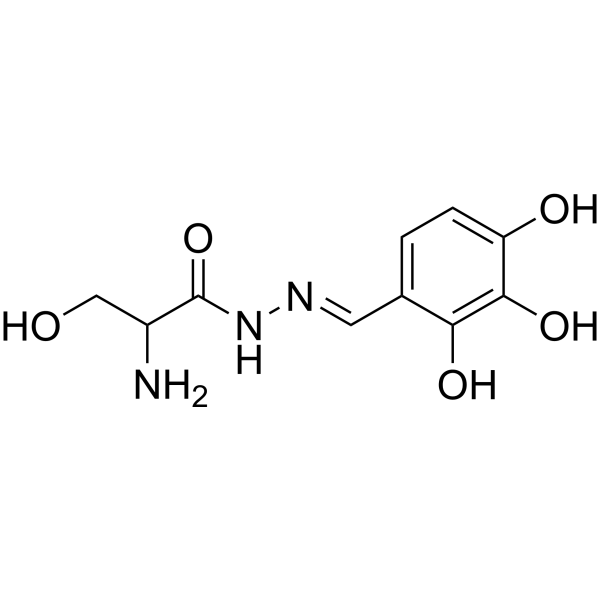
- HY-122611A
-
|
|
Androgen Receptor
Apoptosis
|
Cancer
|
|
CSRM617 hydrochloride is a selective small-molecule inhibitor of the transcription factor ONECUT2 (OC2, a master regulator of androgen receptor) with a Kd of 7.43 uM in SPR assays, binding to OC2-HOX domain directly. CSRM617 hydrochloride induces apoptosis by appearance of cleaved Caspase-3 and PARP. CSRM617 hydrochloride is well tolerated in the prostate cancer mouse model
|
-
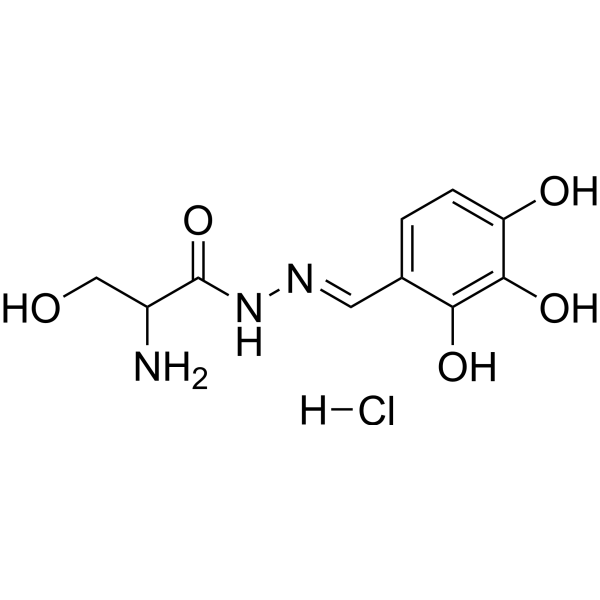
- HY-W020050S
-
|
|
Apoptosis
Caspase
Glutaminase
|
|
|
Cystamine-d8 (dihydrochloride) is the deuterium labeled Cystamine (dihydrochloride)[1]. Cystamine (dihydrochloride) is the disulfide form of the free thiol, cysteamine. Cystamine is an orally active transglutaminase (Tgase) inhibitor. Cystamine also has inhibition activity for caspase-3 with an IC50 value of 23.6 μM. Cystamine can be used for the research of severals diseases including Huntington's disease (HD)[2][3][4].
|
-
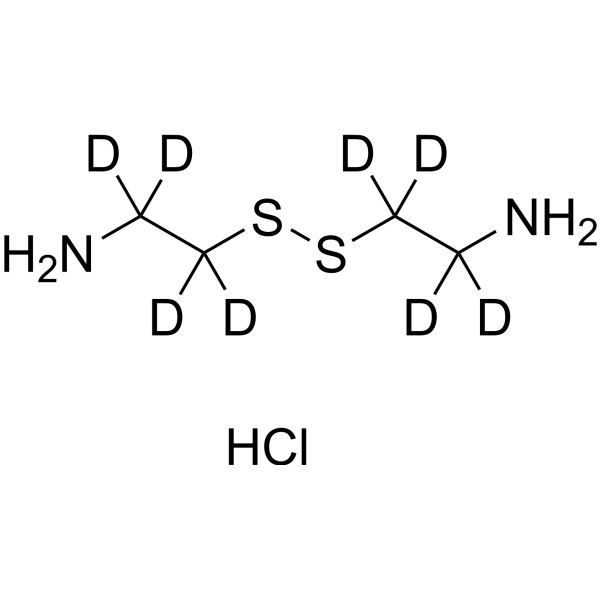
- HY-143235
-
|
|
Epigenetic Reader Domain
Apoptosis
Bcl-2 Family
Caspase
c-Myc
|
Cancer
|
|
BRD4 Inhibitor-15 (compound 13) is a potent BRD4 inhibitor, with an IC50 of 18 nM. BRD4 Inhibitor-15 induces apoptosis of 22RV1 cells by regulating Bcl-2/Bax proteins and activating caspase-3 signaling pathway. BRD4 Inhibitor-15 down-regulates the c-Myc level in 22RV1 cells. BRD4 Inhibitor-15 can be used for prostate cancer research .
|
-
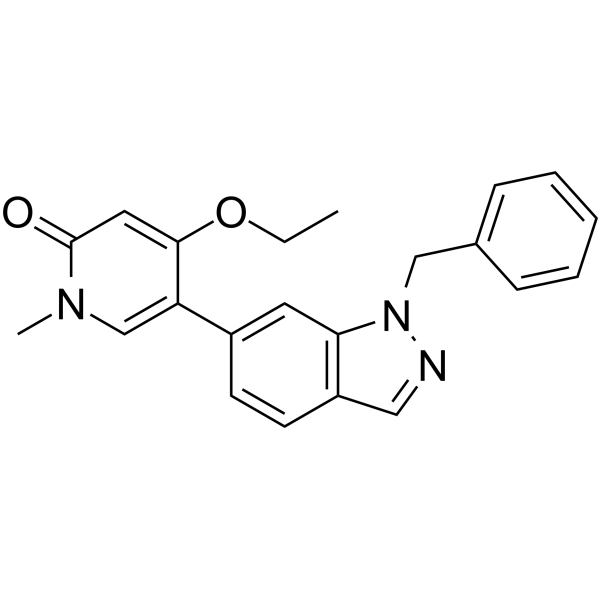
- HY-N0265
-
|
|
Caspase
Apoptosis
|
Cardiovascular Disease
|
|
Asperosaponin VI, A saponin component from Dipsacus asper, induces osteoblast differentiation through BMP‐2/p38 and ERK1/2 pathway . Asperosaponin Ⅵ inhibits apoptosis in hypoxia-induced cardiomyocyte by increasing the Bcl-2/Bax ratio and decreasing active caspase-3 expression, as well as enhancing of p-Akt and p-CREB .
|
-
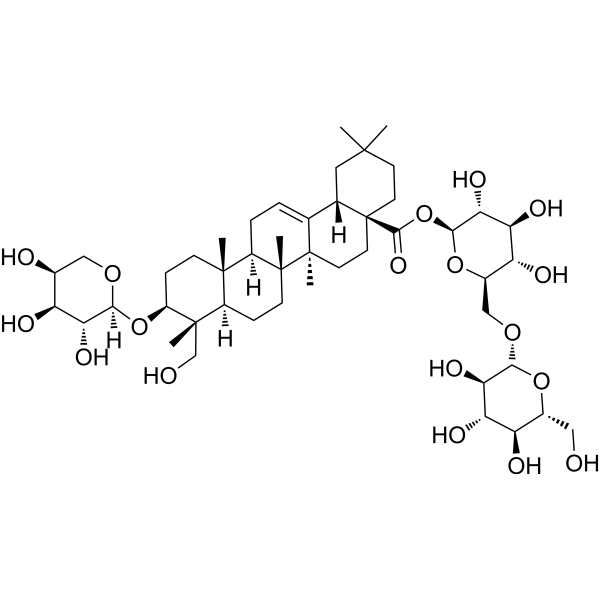
- HY-100035
-
|
|
|
|
|
PT-262 is a potent ROCK inhibitor with an IC50 value of around 5 μM. PT-262 induces the loss of mitochondrial membrane potential and elevates the caspase-3 activation and apoptosis. PT-262 inhibits the ERK and CDC2 phosphorylation via a p53-independent pathway. PT-262 blocks cytoskeleton function and cell migration. PT-262 has anti-cancer activity .
|
-
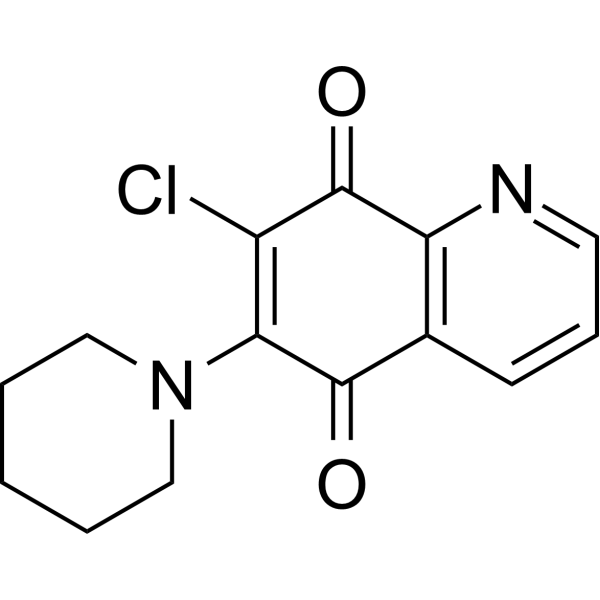
- HY-N1970
-
|
|
|
|
|
5,7-Dihydroxychromone, the extract of Cudrania tricuspidata, activates Nrf2/ARE signal and exerts neuroprotective effects against 6-hydroxydopamine (6-OHDA)-induced oxidative stress and apoptosis. 5,7-Dihydroxychromone inhibits the expression of activated caspase-3 and caspase-9 and cleaved PARP in 6-OHDA-induced SH-SY5Y cells .
|
-
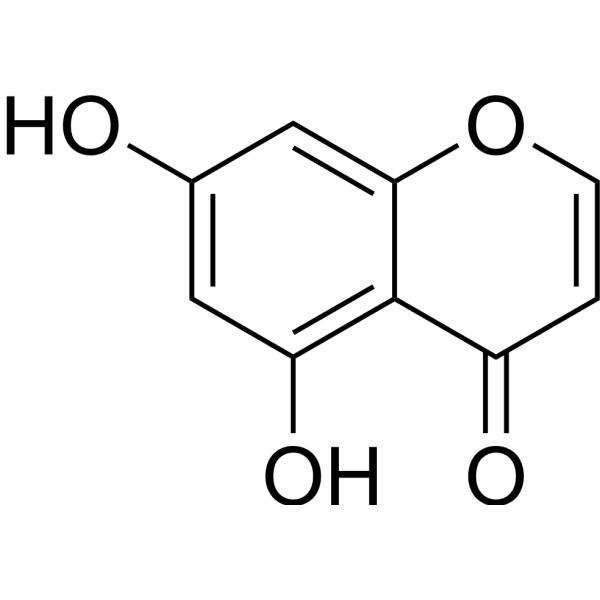
- HY-N0702
-
|
|
Beta-secretase
Cholinesterase (ChE)
|
Neurological Disease
|
|
Tenuifolin is effective and has a protective action. Tenuifolin inhibits β-secretase decreases Aβ protein secretion, suppresses Aβ25-35 secretion, and subsequently caspase-3 and caspase-9 become active. Tenuifolin's ability to lower AChE activity, increase at the same time, increase the ability of the upper glands, and improve the ability to read and remember. Research on tenuifolin's potential for use in urinary disease (AD).
|
-
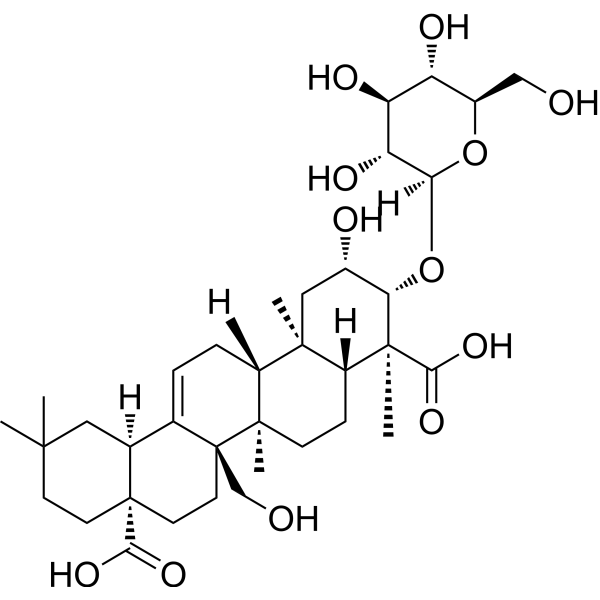
- HY-P5156
-
|
|
Potassium Channel
|
Neurological Disease
|
|
BDS-I known as blood depressing substance, is a marine toxin which can be extracted from Anemonia sulcata. BDS-I is a specific inhibitor of Potassium Channel, targeting to Kv3.4. BDS-I inhibits Aβ1-42-induced enhancement of KV3.4 activity, caspase-3 activation, and abnormal nuclear morphology of NGF-differentiated PC-12 cells. BDS-I reverts the Aβ peptide-induced cell death .
|
-

- HY-151443
-
|
|
HDAC
|
Cancer
|
|
HDAC-IN-47 is an orally active inhibitor of histone deacetylase (HDAC), with IC50s of 19.75 nM (HDAC1), 5.63 nM (HDAC2), 40.27 nM (HDAC3), 57.8 nM (HDAC2), 302.73 nM (HDAC8), respectively. HDAC-IN-47 inhibits autophagy and induces apoptosis via the Bax/Bcl-2 and caspase-3 pathways. HDAC-IN-47 arrests cell cycle at G2/M phase, and shows anti-tumor efficacy in vivo .
|
-
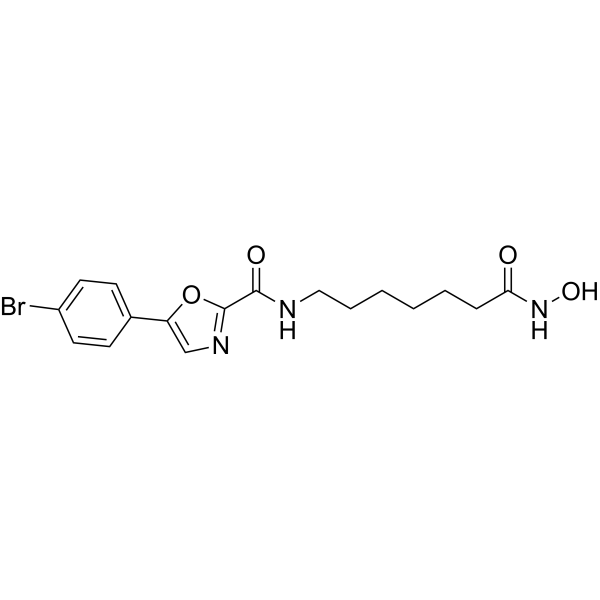
- HY-130437
-
|
|
MDM-2/p53
TGF-β Receptor
Caspase
|
Infection
Metabolic Disease
|
|
p-nitro-Pifithrin-α, a cell-permeable analog of pifithrin-α, is a potent p53 inhibitor. p-nitro-Pifithrin-α suppresses p53-mediated TGF-β1 expression in HK-2 cells. p-nitro-Pifithrin-α inhibits the activation of caspase-3 by Zika virus (ZIKV) strains. p-nitro-Pifithrin-α attenuates steatosis and liver injury in mice fed a high-fat diet [4].
non-alcoholic fatty liver disease .
|
-
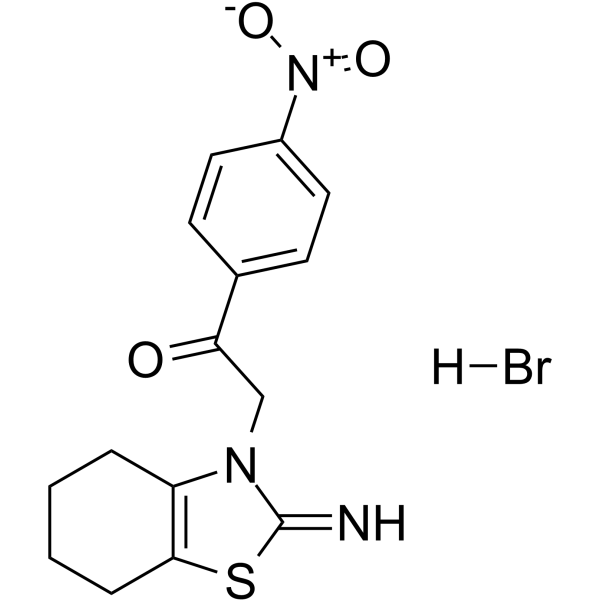
- HY-155808
-
|
|
STAT
JAK
Apoptosis
COX
|
Cancer
|
|
STAT3-IN-18 (compound SPP) is a platinum (IV) complex with an axial ligand derived from sandalwood. STAT3-IN-18 inhibits the JAK2-STAT3 pathway in breast cancer (BC) cells, with anti-proliferative activity. STAT3-IN-18 activates caspase-3 and increases cleaved polyADP-ribose polymerase to induce apoptosis. STAT3-IN-18 promotes maturation and antigen presentation of dendritic cells and demonstrates safety in vivo.
|
-
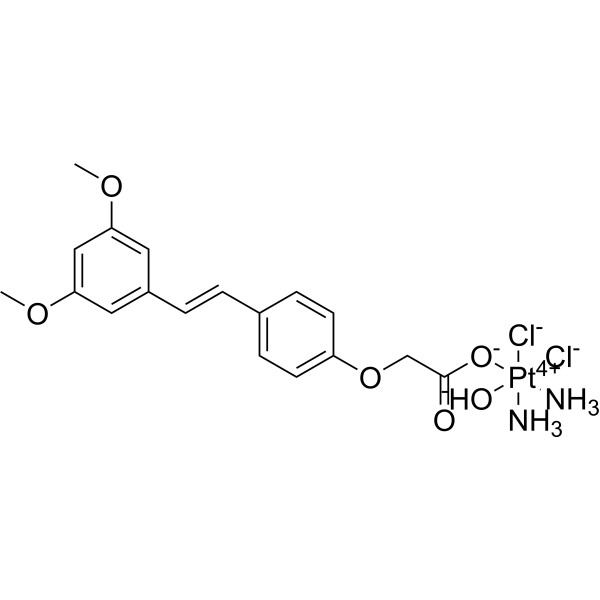
- HY-146253
-
|
|
CDK
Apoptosis
Bcl-2 Family
Caspase
|
Cancer
|
|
CDK1/2/4-IN-1 (compound 3a) is a potent CDK inhibitor with IC50 values of 1.47, 0.78 and 0.87 μM for CDK1, CDK2 and CDK4, respectively. CDK1/2/4-IN-1 arrests cell cycle at G2/M phase and induces apoptosis. CDK1/2/4-IN-1 elevates Bax, caspase-3, P53 levels and decreases Bcl-2 level. CDK1/2/4-IN-1 can be used for cancer research .
|
-
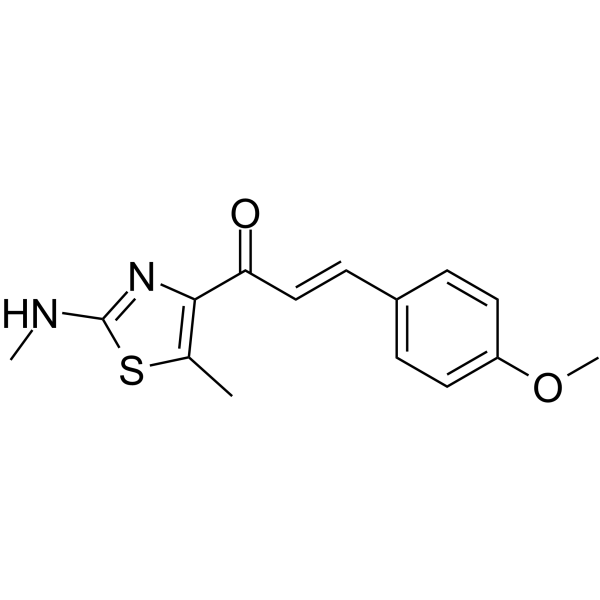
- HY-156096
-
|
|
HDAC
Histone Methyltransferase
Caspase
Apoptosis
DNA/RNA Synthesis
|
Cancer
|
|
HDAC3-IN-2 (compound 4i) is a pyrazinyl hydrazide-based HDAC3 inhibitor (IC50: 14 nM) that efficiently targets triple-negative breast cancer cells. HDAC3-IN-2 is cytotoxic with an IC50 of 0.55 μM against 4T1 and an IC50 of 0.74 μM against MDA-MB-231. HDAC3-IN-2 has anti-tumor efficacy in vivo in tumor-bearing mouse models, selectively increasing the acetylation levels of H3K9, H3K27 and H4K12, increasing the contents of apoptosis-related caspase-3, caspase-7 and cytochrome c, and reducing Proliferation-related Bcl-2, CD44, EGFR, and Ki-67 levels .
|
-
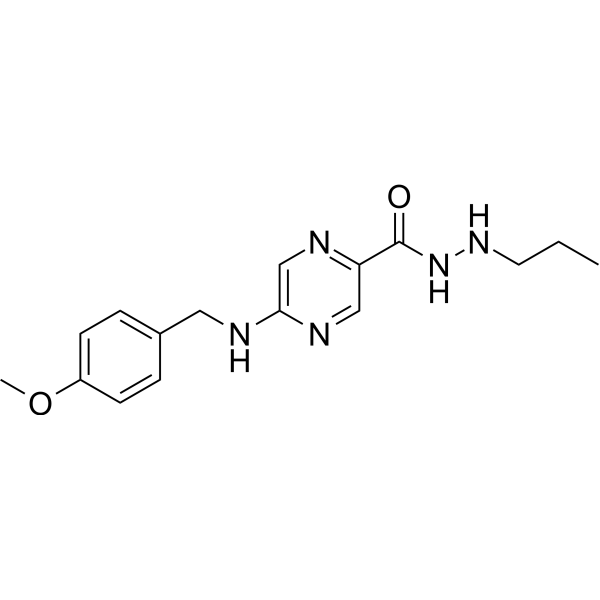
- HY-P3528
-
|
|
Caspase
Apoptosis
|
Neurological Disease
|
|
GPR is a three amino acid peptide. GPR can rescue cultured rat hippocampal neurons from Aβ-induced neuronal death by inhibiting caspase-3/p53 dependent apoptosis. GPR can be used for the research of Alzheimer's disease (AD).
|
-
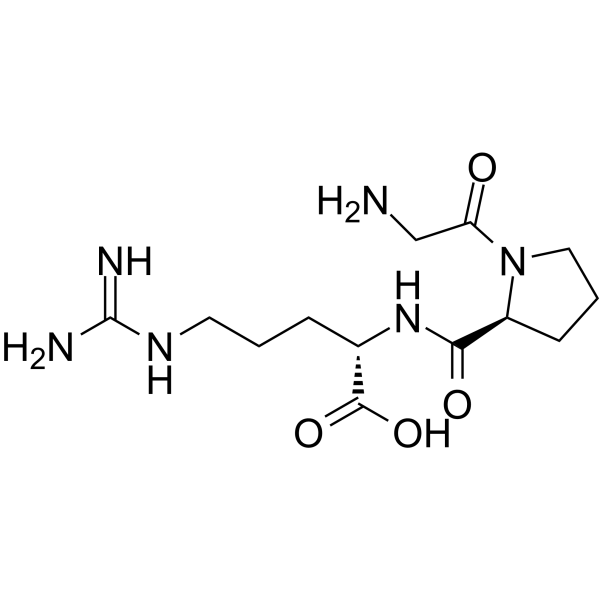
- HY-P2374
-
|
|
Caspase
Apoptosis
|
Neurological Disease
|
|
Ac-DMQD-CHO is a selective inhibitor for caspase 3, with IC50 of 39 nM. Ac-DMQD-CHO reduces apoptosis, and exhibits neuroprotective efficacy .
|
-

- HY-151428
-
|
|
Ferroptosis
Apoptosis
Bcl-2 Family
COX
|
Cancer
|
|
Antitumor agent-78 is an antitumor agent, inhibits cancer cells growth and migration. Antitumor agent-78 triggers ferroptosis by inhibiting GPx-4 and elevating COX2. Antitumor agent-78 also activates intrinsic apoptotic pathway (Bax-Bcl-2-caspase-3) and hinders Epithelial-mesenchymal transition (EMT) process of cancer cells .
|
-
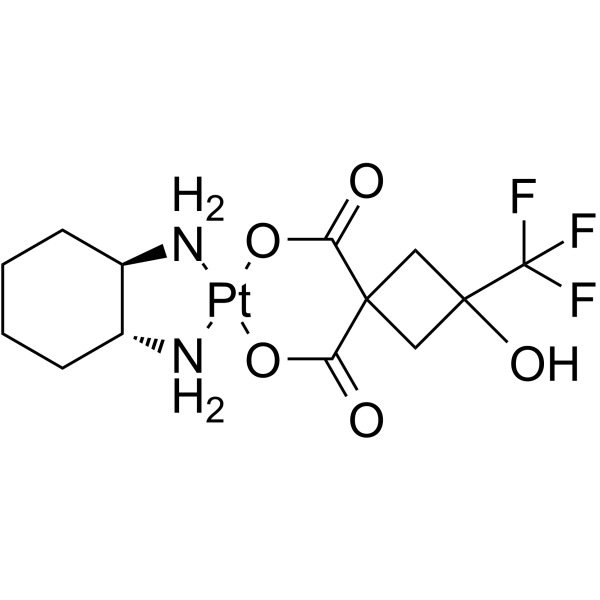
- HY-151429
-
|
|
Apoptosis
Ferroptosis
Bcl-2 Family
COX
|
Cancer
|
|
Antitumor agent-77 is an antitumor agent, inhibits cancer cells growth and migration. Antitumor agent-77 triggers ferroptosis by inhibiting GPx-4 and elevating COX2. Antitumor agent-77 also activates intrinsic apoptotic pathway (Bax-Bcl-2-caspase-3) and hinders Epithelial-mesenchymal transition (EMT) process of cancer cells .
|
-
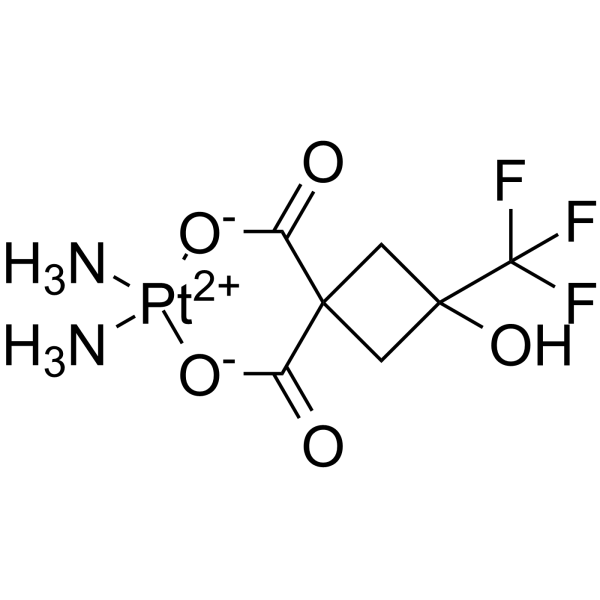
- HY-10397A
-
MX1013
2 Publications Verification
CV1013; Z-VD-FMK
|
Caspase
|
Cancer
|
|
MX1013 is a potent, irreversible dipeptide caspase inhibitor vith antiapoptotic activity. MX1013 inhibits recombinant human caspase 3 with an IC50 of 30 nM .
|
-
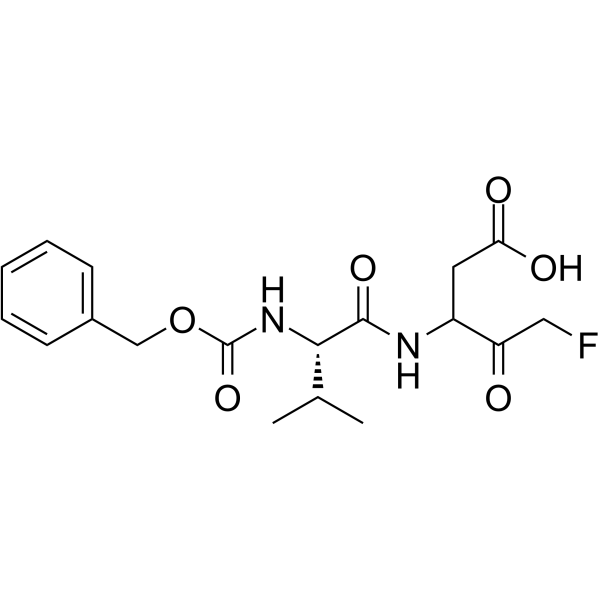
- HY-117889
-
|
|
PARP
Apoptosis
|
Cancer
|
|
PARP14 inhibitor H10, compound H 10, is a selective inhibitor against PARP14 (IC50=490 nM), over other PARPs (≈24 fold over PARP1). PARP14 inhibitor H10 induces caspase-3/7-mediated cell apoptosis .
|
-
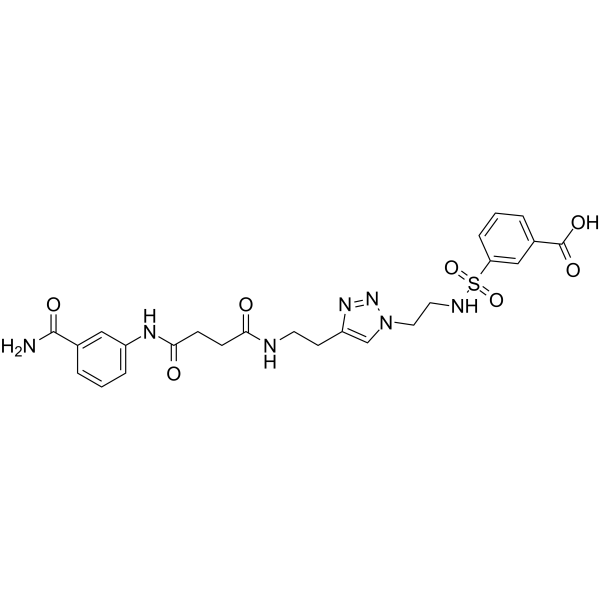
- HY-162059
-
|
|
Pim
Apoptosis
Caspase
|
Cancer
|
|
Pim-1 kinase inhibitor 10 (compound 13a) is a both competitive and non-competitive inhibitor of PIM-1/2 kinase. Pim-1 kinase inhibitor 10 can induce cell apoptosis and exhibits anticancer activity. Pim-1 kinase inhibitor 10 also induces caspase 3/7 activation .
|
-
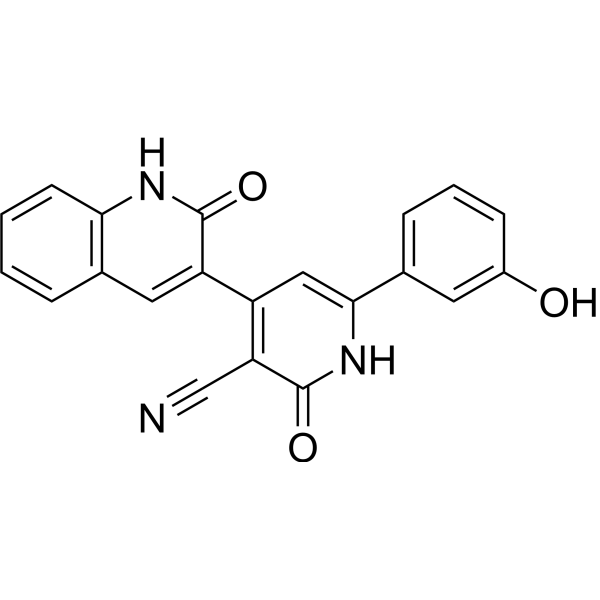
- HY-152108
-
|
|
SARS-CoV
|
Infection
|
|
SARS-CoV-2 Mpro-IN-6 is a covalent, irreversible and selective SARS-CoV-2 M pro inhibitor with an IC50 of 0.18 μM. SARS-CoV-2 Mpro-IN-6 does not inhibit human cathepsins B, F, K, and L, and caspase 3 .
|
-
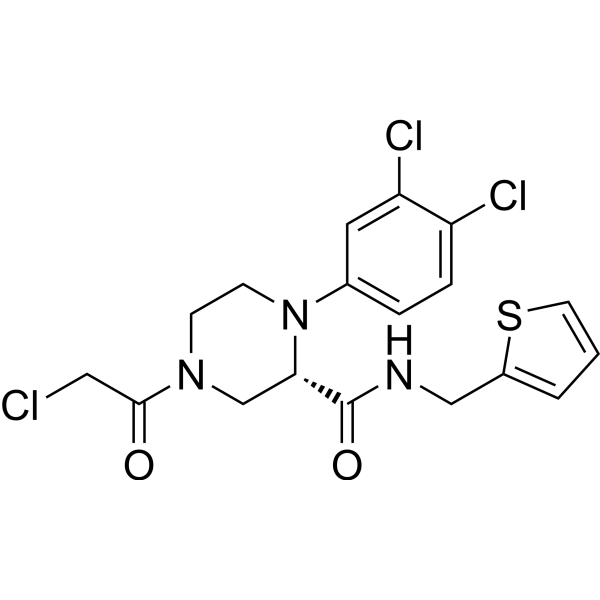
- HY-12290
-
|
RGDS peptide; Fibronectin tetrapeptide
|
Integrin
|
Inflammation/Immunology
|
|
Arg-Gly-Asp-Ser is an integrin binding sequence that inhibits integrin receptor function. Arg-Gly-Asp-Ser directly and specifically bind pro-caspase-8, pro-caspase-9 and pro-caspase-3, while it does not bind pro-caspase-1.
|
-
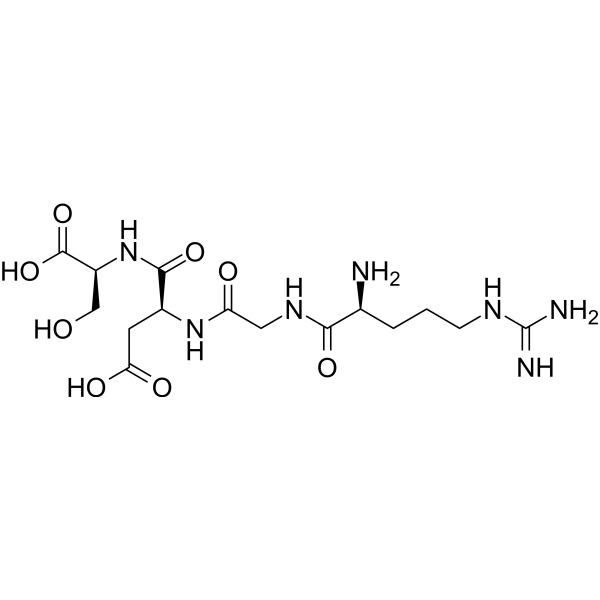
- HY-111770
-
|
2-Bromopalmitic acid; 2-Bromopalmitate
|
Pyroptosis
|
Infection
Inflammation/Immunology
Cancer
|
|
2-Bromohexadecanoic acid (2-Bromopalmitic acid) can be converted to 2-bromopalmitate (2-BP). 2-BP is a palmitoylation inhibitor targeting DHHC (Asp-His-His-Cys) protein palmitoyltransferase. 2-BP inhibits palmitoylation of GSDME-C during pyroptosis and inhibits BAK/BAX-Caspase 3-GSDME pathway-mediated pyroptosis .
|
-
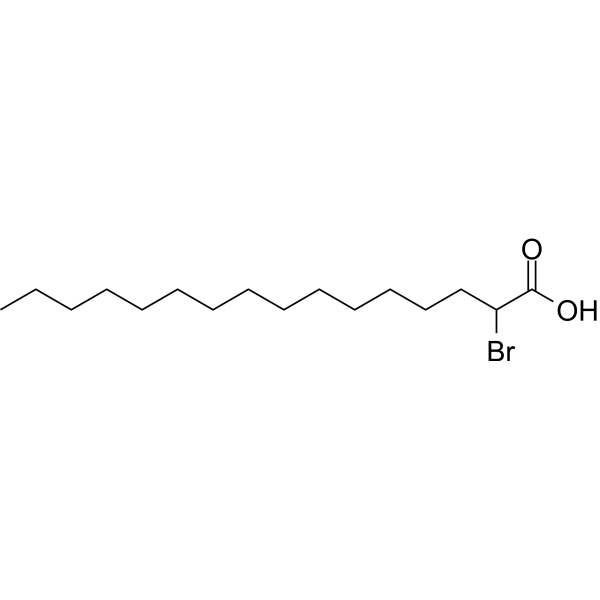
- HY-N0745
-
|
|
Caspase
|
Inflammation/Immunology
|
|
Senkyunolide I, isolated from Ligusticum chuanxiong Hort, is an anti-migraine compound. Senkyunolide I protects rat brain against focal cerebral ischemia-reperfusion injury by up-regulating p-Erk1/2, Nrf2/HO-1 and inhibiting caspase 3 .
|
-
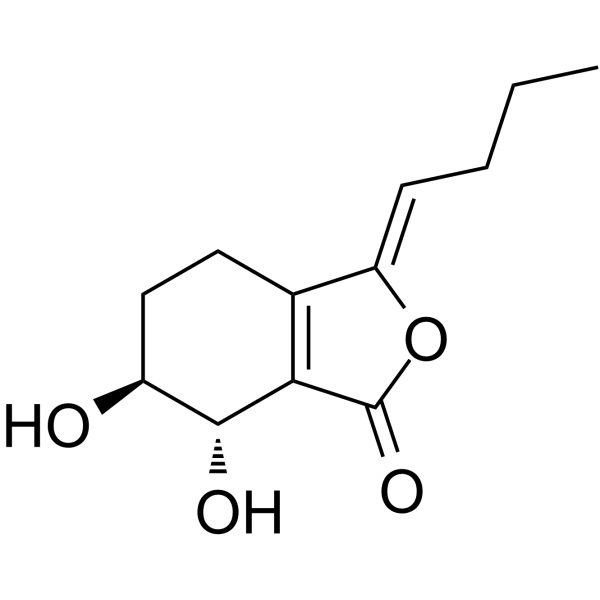
- HY-12290A
-
|
RGDS peptide TFA; Fibronectin tetrapeptide TFA
|
Integrin
|
Inflammation/Immunology
|
|
Arg-Gly-Asp-Ser (TFA) is an integrin binding sequence that inhibits integrin receptor function. Arg-Gly-Asp-Ser (TFA) directly and specifically bind pro-caspase-8, pro-caspase-9 and pro-caspase-3, while it does not bind pro-caspase-1 .
|
-
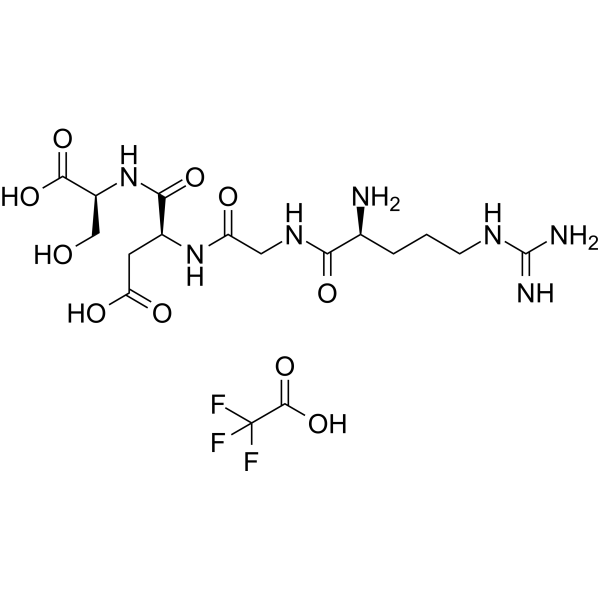
- HY-136733
-
|
Ac-Asp-Asn-Leu-Asp-CHO
|
Caspase
|
Infection
Neurological Disease
|
|
Ac-DNLD-CHO (Ac-Asp-Asn-Leu-Asp-CHO) is a Caspase-3/7 inhibitor (IC50: 9.89, 245 nM respectively; Ki app: 0.68, 55.7 nM respectively). Ac-DNLD-CHO can be used for research of caspase-mediated apoptosis diseases, such as neurodegenerative disorders and viral infection diseases .
|
-
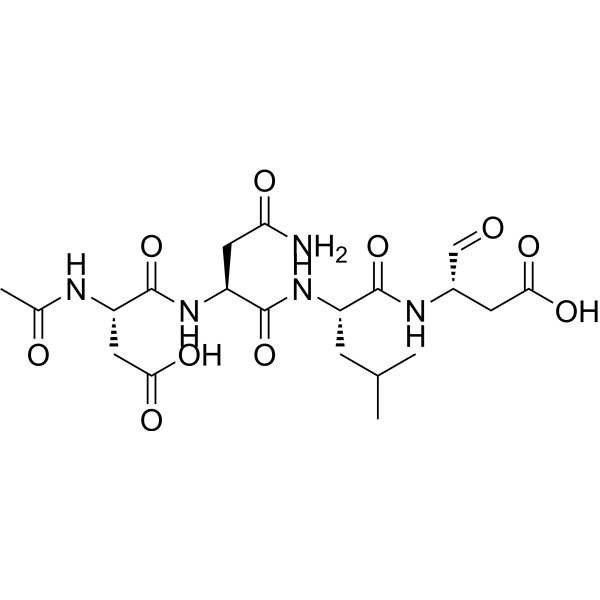
- HY-P1740
-
|
|
Integrin
Apoptosis
|
Inflammation/Immunology
|
|
RGD peptide (GRGDNP) is an inhibitor of integrin-ligand interactions. RGD peptide (GRGDNP) competitively inhibits α5β1 binding with extracellular matrice (ECM). RGD peptide (GRGDNP) promotes apoptosis through activation of conformation changes that enhance pro-caspase-3 activation and autoprocessing. RGD peptide (GRGDNP) plays an important role in cell adhesion, migration, growth, and differentiation .
|
-
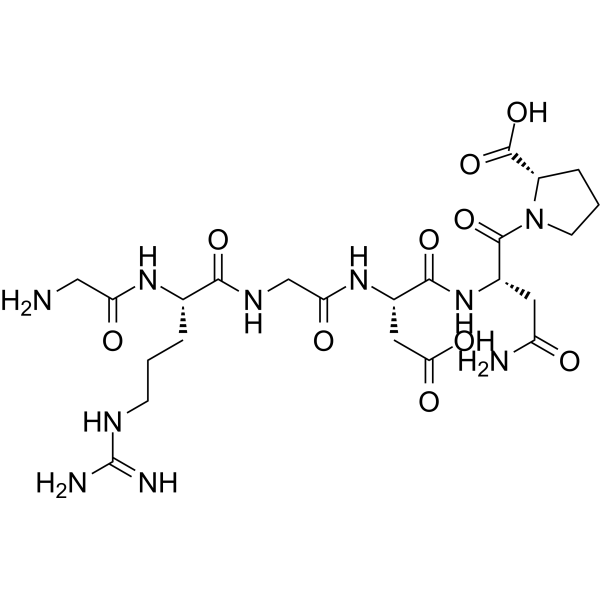
- HY-13326
-
ASP3026
5 Publications Verification
|
Anaplastic lymphoma kinase (ALK)
Apoptosis
ROS Kinase
Caspase
PARP
IGF-1R
STAT
Akt
JNK
|
Cancer
|
|
ASP3026 is a selective and orally active inhibitor of anaplastic lymphoma kinase (ALK). ASP3026 is a selective and oral active anaplastic lymphoma kinase (ALK) inhibitor with a IC50 value of 3.5 nM. ASP3026 can inhibit the phosphorylation of IGF-1R, STAT3, AKT and JNK proteins, and induce the cleavage of caspase 3 and PARP. It also inhibited ROS and ACK. ASP3026 can be used in anti-tumor research .
|
-
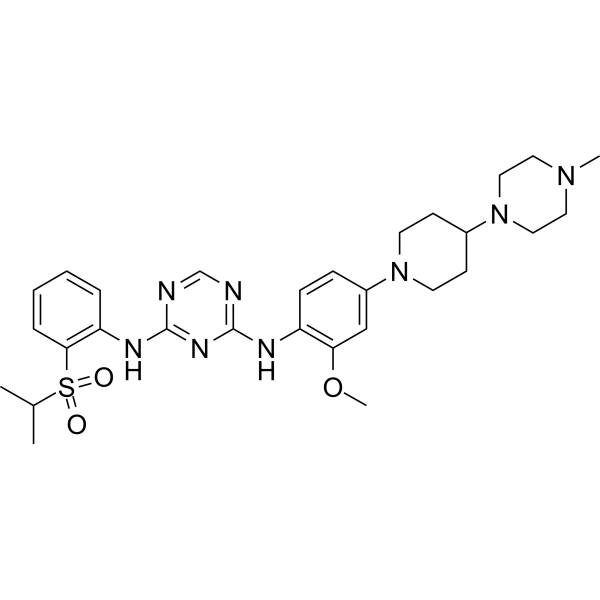
- HY-108599
-
DCP-LA
2 Publications Verification
FR236924
|
PKC
CaMK
Phosphatase
Apoptosis
|
Neurological Disease
|
|
DCP-LA (FR236924), a linoleic acid derivative, selectively and directly activates PKCε. DCP-LA activates Ca( 2+)/calmodulin-dependent protein kinase II (CaMKII) and inhibits protein phosphatase-1 (PP-1) to stimulate AMPA receptor exocytosis. DCP-LA inhibits activation of caspase-3/-9 and protects neurons at least in part from oxidative stress-induced apoptosis .
|
-
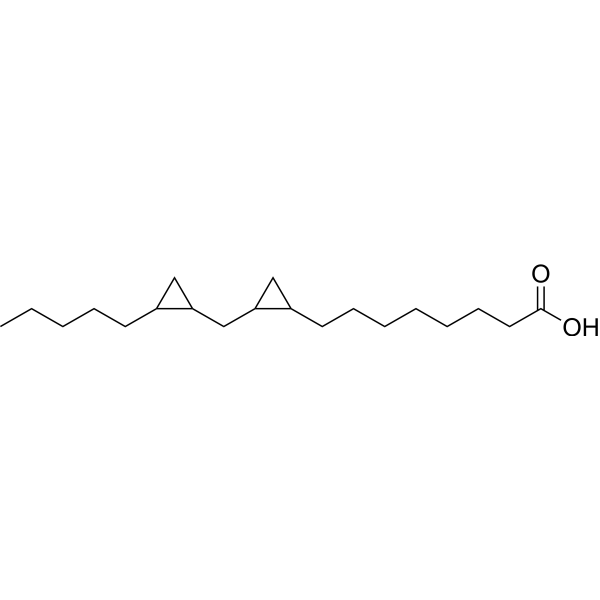
- HY-P1740A
-
|
|
Integrin
Apoptosis
|
Inflammation/Immunology
Cancer
|
|
RGD peptide (GRGDNP) TFA is an inhibitor of integrin-ligand interactions. RGD peptide (GRGDNP) TFA competitively inhibits α5β1 binding with extracellular matrice (ECM). RGD peptide (GRGDNP) TFA promotes apoptosis through activation of conformation changes that enhance pro-caspase-3 activation and autoprocessing. RGD peptide (GRGDNP) TFA plays an important role in cell adhesion, migration, growth, and differentiation .
|
-
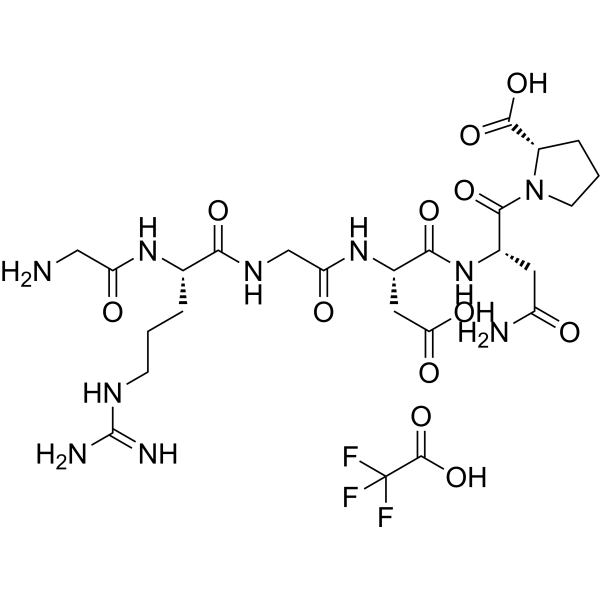
- HY-155570
-
|
|
PI3K
Apoptosis
Caspase
PARP
|
Cancer
|
|
Anticancer agent 137 (8q) is a potent PI3k inhibitor. Anticancer agent 137 has broad-spectrum anticancer activity. Anticancer agent 137 induces G2/M cell cycle arrest and apoptosis. Anticancer agent 137 increases cleaved PARP, caspase 3, and 7. Anticancer agent 137 can be used in research of cancer .
|
-
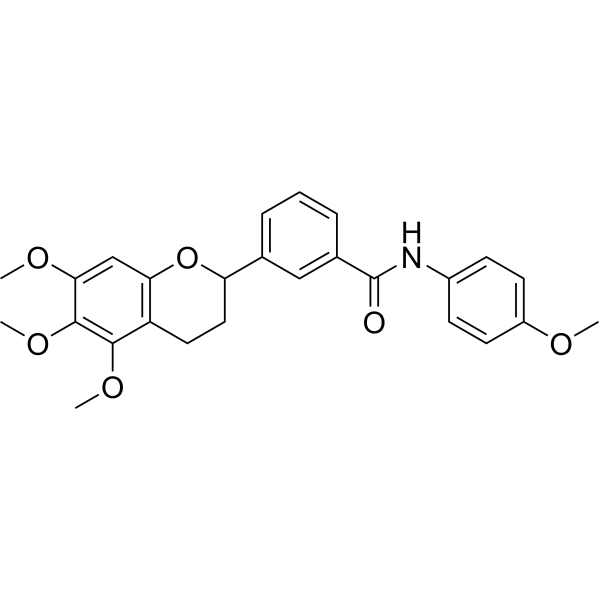
- HY-118304
-
|
|
FLT3
Apoptosis
Caspase
|
Cancer
|
|
AKN-028, a novel tyrosine kinase (TK) inhibitor, is a potent, orally active FMS-like receptor tyrosine kinase 3 (FLT3) inhibitor with an IC50 value of 6 nM. AKN-028 inhibits FLT3 autophosphorylation. AKN-028 induces dose-dependent cytotoxic response (mean IC50=1 μM). AKN-028 induces apoptosisby activation of caspase 3. AKN-028 can be used in research of acute myeloid leukemia (AML) .
|
-
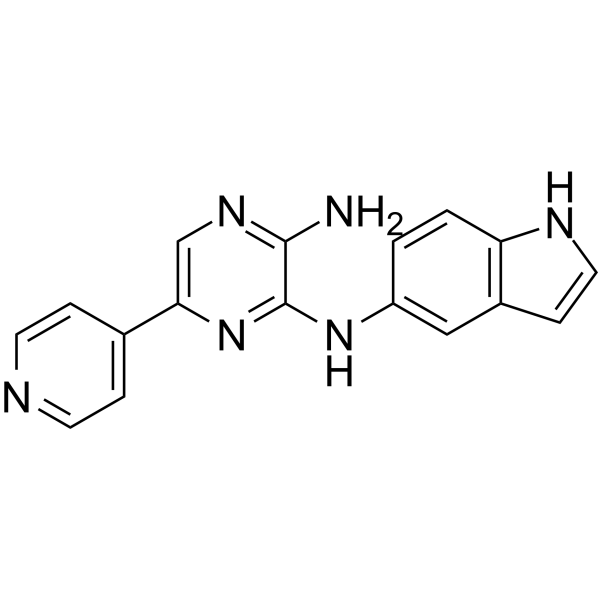
- HY-118304B
-
|
|
FLT3
Apoptosis
Caspase
|
Cancer
|
|
AKN-028 acetate, a novel tyrosine kinase (TK) inhibitor, is a potent, orally active FMS-like receptor tyrosine kinase 3 (FLT3) inhibitor with an IC50 value of 6 nM. AKN-028 acetate inhibits FLT3 autophosphorylation. AKN-028 acetate induces dose-dependent cytotoxic response (mean IC50=1 μM). AKN-028 acetate induces apoptosisby activation of caspase 3. AKN-028 acetate can be used in research of acute myeloid leukemia (AML).
|
-
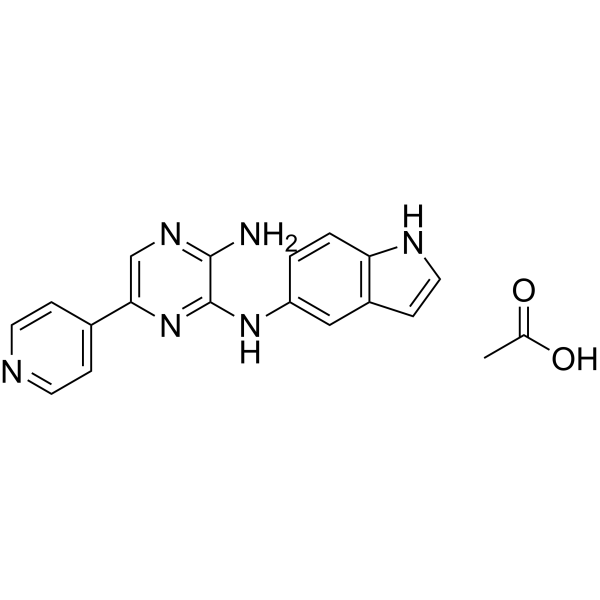
- HY-103645
-
|
|
Bacterial
Aurora Kinase
Apoptosis
|
Infection
Cancer
|
|
GW779439X is a pyrazolopyridazine identified in an inhibitor of the S. aureus PASTA kinase Stk1. GW779439X potentiates the activity of β-lactam antibiotics against various MRSA and MSSA isolates, some even crossing the breakpoint from resistant to sensitive. GW779439X is an AURKA inhibitor and induces apoptosis by the caspases 3/7 pathway . MRSA:methicillin-resistant S. aureus; MSSA: methicillin-sensitive S. aureus
|
-
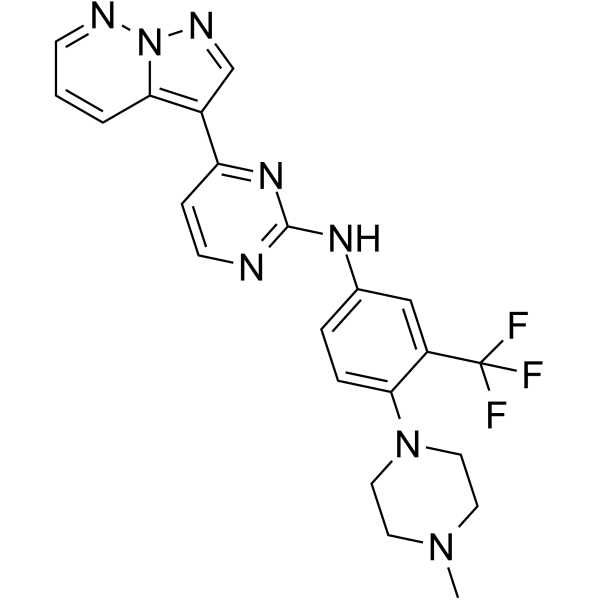
- HY-151966
-
|
|
PROTACs
IAP
Caspase
|
Cancer
|
|
TD1092 is a pan-IAP degrader, degrades cIAP1, cIAP2, and XIAP. TD1092 activates Caspase 3/7, and promotes cancer cells apoptosis via IAP degradation. TD1092 inhibits TNFα mediated NF-κB pathway and reduces the phosphorylation of IKK, IkBα, p65, and p38. TD1092 can act as PROTAC, and is used for cancer research .
|
-
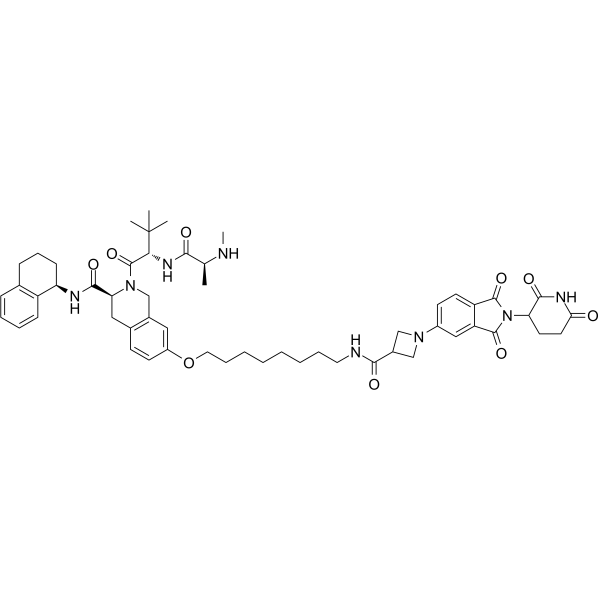
- HY-18980
-
|
Mallotoxin; NSC 56346; NSC 94525
|
PKC
Autophagy
Apoptosis
HIV
RABV
|
Infection
Cancer
|
|
Rottlerin, a natural product purified from Mallotus Philippinensis, is a specific PKC inhibitor, with IC50 values for PKCδ of 3-6 μM, PKCα,β,γ of 30-42 μM, PKCε,η,ζ of 80-100 μM. Rottlerin acts as a direct mitochondrial uncoupler, and stimulates autophagy by targeting a signaling cascade upstream of mTORC1. Rottlerin induces apoptosis via caspase 3 activation . Rottlerin inhibits HIV-1 integration and Rabies virus (RABV) infection .
|
-
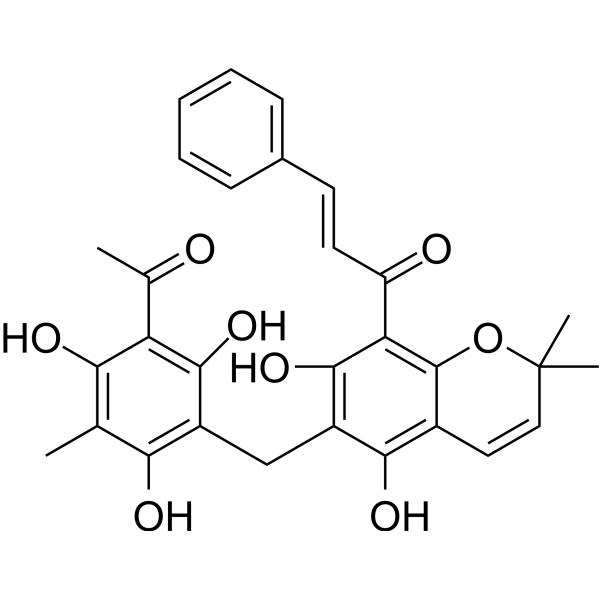
- HY-144806
-
|
|
PI3K
Akt
Apoptosis
|
Cancer
|
|
PI3K/AKT-IN-1 is an effective PI3K/AKT dual inhibitor (IC50 of 6.99, 4.01 and 3.36 μM for PI3Kγ, PI3Kδ and AKT, respectively). PI3K/AKT-IN-1 has anticancer activity and acts by inhibiting PI3K/AKT axis and inducing caspase 3 dependent apoptosis .
|
-
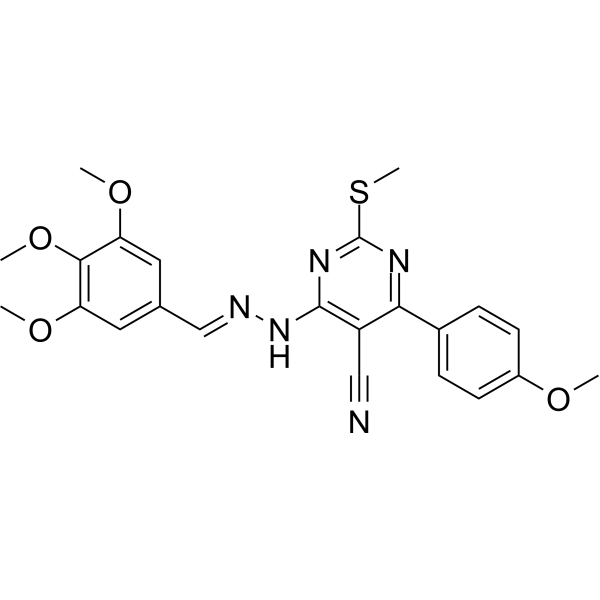
- HY-118119
-
|
|
PGE synthase
|
Cancer
|
|
CAY10526 is a specific microsomal PGE2 synthase-1 (mPGES1) inhibitor. CAY10526 inhibits PGE2 production through the selective modulation of mPGES1 expression but does not affect COX-2. CAY10526 significantly suppresses tumor growth and increases apoptosis in melanoma xenografts. CAY10526 reduces BCL-2 and BCL-XL (anti-apoptotic) protein levels and increases BAX and BAK (pro-apoptotic) as well as cleaved caspase 3 levels. CAY10526 inhibits cell viability (IC50<5 μM) in three melanoma cell lines expressing mPGES1 .
|
-
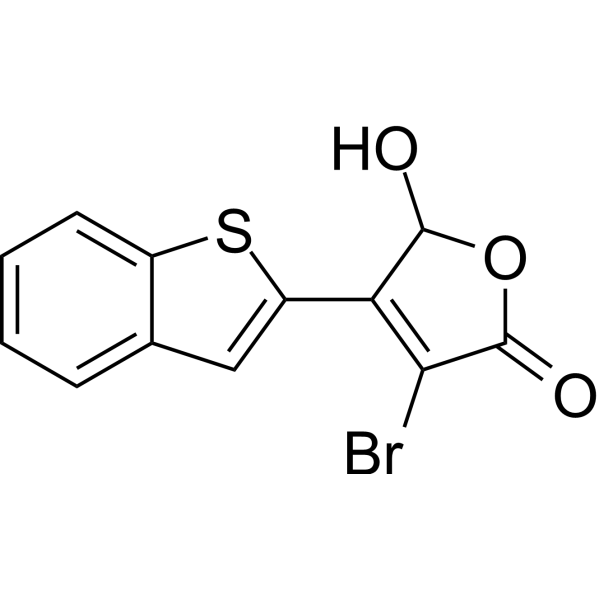
- HY-151153
-
|
|
HDAC
Microtubule/Tubulin
Caspase
Apoptosis
|
Cancer
|
|
HDAC1-IN-5 is a potent HDAC1 inhibitor with IC50 values of 15 nM and 20 nM for HDAC1 and HDAC6, respectively. HDAC1-IN-5 can enhance the acetylation of histone H3 and α-tubulin, as well as promote the activation of caspase 3 in cancer cells, thereby inducing apoptosis. HDAC1-IN-5 induces chromatin damage by binding with DNA. HDAC1-IN-5 has strong inhibitory activity against tumor growth in xenograft mice .
|
-
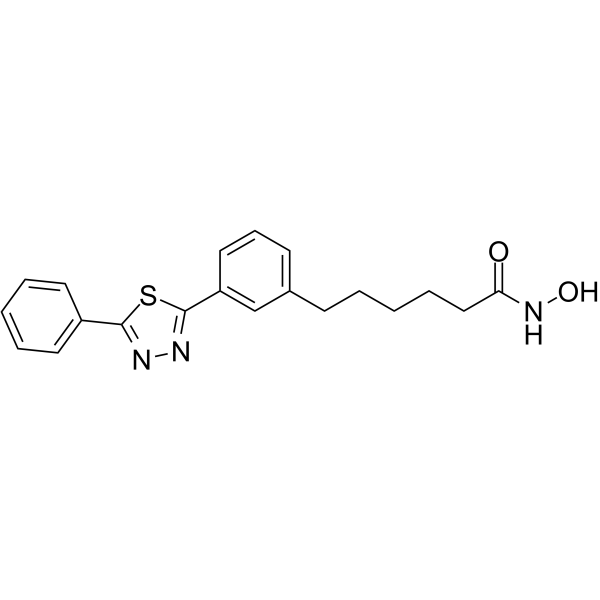
- HY-13265
-
AR-42
2 Publications Verification
HDAC-42; OSU-HDAC42
|
HDAC
Autophagy
Apoptosis
|
Cancer
|
|
AR-42 (HDAC-42; OSU-HDAC42) is a potent, orally bioavailable pan-HDAC inhibitor (IC50=16 nM). AR-42 induces growth inhibition, cell-cycle arrest, apoptosis, and activation of caspases-3/7. AR-42 promotes hyperacetylation of H3, H4, and alpha-tubulin, and up-regulation of p21. AR-42 shows cytotoxicity against various human cancer cell lines .
|
-
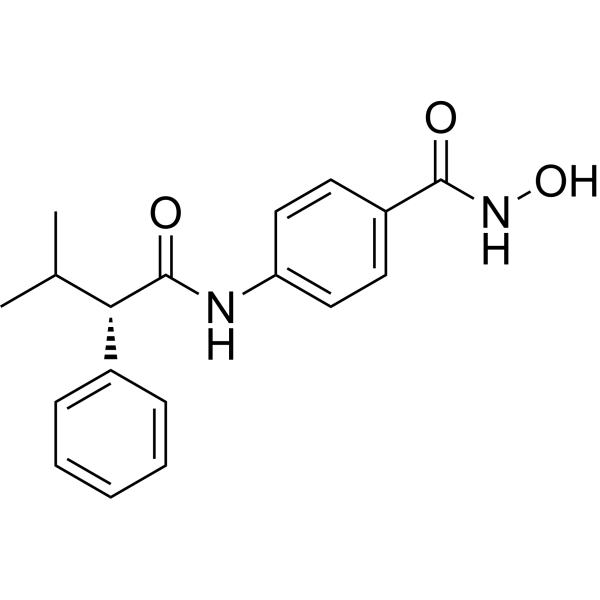
- HY-112296
-
T025
2 Publications Verification
|
CDK
Apoptosis
DYRK
|
Cancer
|
|
T025 is an orally active and highly potent inhibitor of Cdc2-like kinase (CLKs), with Kd values of 4.8, 0.096, 6.5, 0.61, 0.074, 1.5 and 32 nM for CLK1, CLK2, CLK3, CLK4, DYRK1A, DYRK1B and DYRK2, respectively. T025 induces caspase-3/7-mediated cell apoptosis. T025 reduces CLK-dependent phosphorylation. T025 exerts anti-proliferative activities in both hematological and solid cancer cell lines (IC50 values: 30-300 nM). T025 has an anti-tumor efficiency, mainly for MYC-driven disease research .
|
-
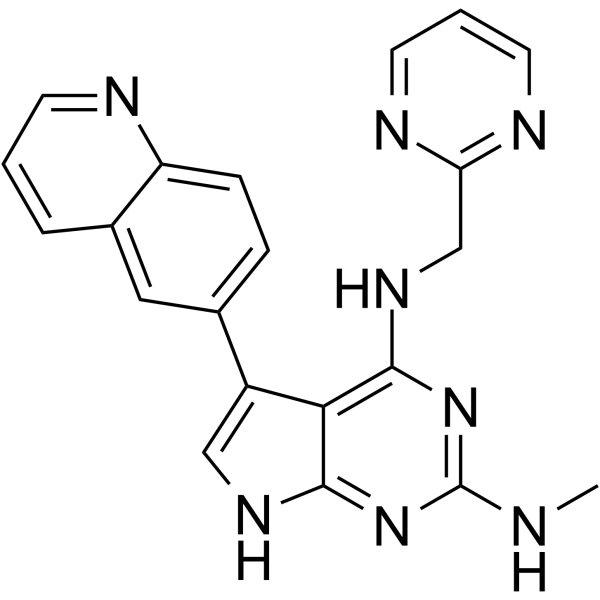
| Cat. No. |
Product Name |
Type |
-
- HY-D0086
-
|
MDL101114ZA
|
Dyes
|
|
DIDS sodium salt (MDL101114ZA) is a dual inhibitor of ABCA1 and VDAC1. DIDS also inhibits RAD51, inhibiting RAD51-mediated homologous pairing and strand exchange reactions. DIDS inhibits anion exchange and binding to red blood cell membranes, inhibits the activation of caspase-3 and -9, and can be used in cancer research .
|
-
- HY-D1432
-
|
|
Fluorescent Dyes/Probes
|
|
FITC-C6-DEVD-FMK, a fluorescently labeled caspase-3 inhibitor, can be used for detection of active caspase-3 in mammalian cells undergoing apoptosis. FITC-C6-DEVD-FMK provides a convenient means for sensitive detection of activated caspase-3 in living cells. Z-DEVD-FMK is a specific caspase-3 inhibitor .
|
| Cat. No. |
Product Name |
Target |
Research Area |
-
- HY-P0034A
-
|
caspase-3 inhibitor III TFA
|
Caspase
Apoptosis
|
Metabolic Disease
|
|
Ac-DEVD-CMK (Caspase-3 Inhibitor III) TFA is a selective and irreversible caspase-3 inhibitor. Ac-DEVD-CMK TFA significantly inhibits apoptosis induced by high levels of glucose or 3,20-dibenzoate (IDB; HY-137295). Ac-DEVD-CMK TFA can be used in a variety of experimental approaches to inhibit apoptosis .
|
-
- HY-P1001
-
Ac-DEVD-CHO
Maximum Cited Publications
28 Publications Verification
|
Caspase
|
Cancer
|
|
Ac-DEVD-CHO is a specific Caspase-3 inhibitor with a Ki value of 230 pM.
|
-
- HY-P10162
-
|
|
Caspase
|
Cancer
|
|
Ac-DMQD-AMC is an inhibitor of caspase-3. Ac-DMQD-AMC is an aromatic amine using aminium-based coupling reagent HATU in the presence of 2,4,6-trimethylpyridine (TMP) .
|
-
- HY-P4900
-
|
|
Caspase
|
Others
|
|
Fluorescein-6-carbonyl-Asp(OMe)-Glu(OMe)-Val-DL-Asp(OMe)-fluoromethylketone is a cell-permeable, non-toxic inhibitor that binds irreversibly to activated caspase-3 in apoptotic cells. The fluorescence intensity can be measured by flow cytometry, microwell plate reader, or fluorescence microscopy .
|
-
- HY-P3234
-
|
|
Casein Kinase
|
Others
|
|
Ac-ESMD-CHO is an inhibitor of caspase-3 and caspase-7. Ac-ESMD-CHO inhibits proteolytic cleavage of the caspase-3 precursor peptide (CPP32) at the Glu-Ser-Met-Asp (ESMD) site .
|
-
- HY-W792412
-
|
|
Caspase
|
Cancer
|
|
Z-YVAD-CMK is a caspase-1 and caspase-3 inhibitor .
|
-
- HY-P5936
-
|
DEVD-CHO-CPP 32
|
Caspase
|
Cancer
|
|
Ac-AAVALLPAVLLALLAP-DEVD-CHO (DEVD-CHO-CPP 32) is a potent and reversible caspase-3 inhibitor .
|
-
- HY-P2228
-
|
|
HDAC
Apoptosis
|
Cancer
|
|
Chlamydocin, a fungal metabolite, is a highly potent HDAC inhibitor, with an IC50 of 1.3 nM. Chlamydocin exhibits potent antiproliferative and anticancer activities. Chlamydocin induces apoptosis by activating caspase-3 .
|
-
- HY-141867
-
|
Z-Phe-Phe-FMK
|
Cathepsin
|
Neurological Disease
|
|
Z-FF-FMK is a selective cathepsin-L inhibitor. Z-FF-FMK can prevent β-amyloid to induce apoptotic changes such as activation of caspase-3, cleavage of the DNA repair enzyme, poly-ADP ribose polymerase, and DNA fragmentation .
|
-
- HY-108312A
-
|
|
Caspase
|
Neurological Disease
|
|
AC-VEID-CHO (TFA) is a peptide-derived caspase inhibitor and has potency of inhibition for Caspase-6, Caspase-3 and Caspase-7 with IC50 values of 16.2 nM, 13.6 nM and 162.1 nM, respectively. AC-VEID-CHO (TFA) can be used for the research of neurodegenerative conditions including Alzheimer’s and Huntington’s disease .
|
-
- HY-P5156
-
|
|
Potassium Channel
|
Neurological Disease
|
|
BDS-I known as blood depressing substance, is a marine toxin which can be extracted from Anemonia sulcata. BDS-I is a specific inhibitor of Potassium Channel, targeting to Kv3.4. BDS-I inhibits Aβ1-42-induced enhancement of KV3.4 activity, caspase-3 activation, and abnormal nuclear morphology of NGF-differentiated PC-12 cells. BDS-I reverts the Aβ peptide-induced cell death .
|
-
- HY-P3528
-
|
|
Caspase
Apoptosis
|
Neurological Disease
|
|
GPR is a three amino acid peptide. GPR can rescue cultured rat hippocampal neurons from Aβ-induced neuronal death by inhibiting caspase-3/p53 dependent apoptosis. GPR can be used for the research of Alzheimer's disease (AD).
|
-
- HY-P2374
-
|
|
Caspase
Apoptosis
|
Neurological Disease
|
|
Ac-DMQD-CHO is a selective inhibitor for caspase 3, with IC50 of 39 nM. Ac-DMQD-CHO reduces apoptosis, and exhibits neuroprotective efficacy .
|
-
- HY-12290
-
|
RGDS peptide; Fibronectin tetrapeptide
|
Integrin
|
Inflammation/Immunology
|
|
Arg-Gly-Asp-Ser is an integrin binding sequence that inhibits integrin receptor function. Arg-Gly-Asp-Ser directly and specifically bind pro-caspase-8, pro-caspase-9 and pro-caspase-3, while it does not bind pro-caspase-1.
|
-
- HY-12290A
-
|
RGDS peptide TFA; Fibronectin tetrapeptide TFA
|
Integrin
|
Inflammation/Immunology
|
|
Arg-Gly-Asp-Ser (TFA) is an integrin binding sequence that inhibits integrin receptor function. Arg-Gly-Asp-Ser (TFA) directly and specifically bind pro-caspase-8, pro-caspase-9 and pro-caspase-3, while it does not bind pro-caspase-1 .
|
-
- HY-136733
-
|
Ac-Asp-Asn-Leu-Asp-CHO
|
Caspase
|
Infection
Neurological Disease
|
|
Ac-DNLD-CHO (Ac-Asp-Asn-Leu-Asp-CHO) is a Caspase-3/7 inhibitor (IC50: 9.89, 245 nM respectively; Ki app: 0.68, 55.7 nM respectively). Ac-DNLD-CHO can be used for research of caspase-mediated apoptosis diseases, such as neurodegenerative disorders and viral infection diseases .
|
-
- HY-P1740
-
|
|
Integrin
Apoptosis
|
Inflammation/Immunology
|
|
RGD peptide (GRGDNP) is an inhibitor of integrin-ligand interactions. RGD peptide (GRGDNP) competitively inhibits α5β1 binding with extracellular matrice (ECM). RGD peptide (GRGDNP) promotes apoptosis through activation of conformation changes that enhance pro-caspase-3 activation and autoprocessing. RGD peptide (GRGDNP) plays an important role in cell adhesion, migration, growth, and differentiation .
|
-
- HY-P1740A
-
|
|
Integrin
Apoptosis
|
Inflammation/Immunology
Cancer
|
|
RGD peptide (GRGDNP) TFA is an inhibitor of integrin-ligand interactions. RGD peptide (GRGDNP) TFA competitively inhibits α5β1 binding with extracellular matrice (ECM). RGD peptide (GRGDNP) TFA promotes apoptosis through activation of conformation changes that enhance pro-caspase-3 activation and autoprocessing. RGD peptide (GRGDNP) TFA plays an important role in cell adhesion, migration, growth, and differentiation .
|
| Cat. No. |
Product Name |
Category |
Target |
Chemical Structure |
-
- HY-19696
-
-

-
- HY-19696A
-
-

-
- HY-19696B
-
-

-
- HY-N6681
-
-

-
- HY-N0809
-
-

-
- HY-Y0152
-
-

-
- HY-W748591
-
-

-
- HY-W046353
-
-

-
- HY-W748509
-
-

-
- HY-N0265
-
-

-
- HY-N0702
-
-

-
- HY-N0745
-
-

-
- HY-18980
-
|
Mallotoxin; NSC 56346; NSC 94525
|
Structural Classification
Chalcones
Flavonoids
Classification of Application Fields
Source classification
Phenols
Polyphenols
Euphorbiaceae
Plants
Disease Research Fields
Mallotus philippensis
Cancer
|
PKC
Autophagy
Apoptosis
HIV
RABV
|
|
Rottlerin, a natural product purified from Mallotus Philippinensis, is a specific PKC inhibitor, with IC50 values for PKCδ of 3-6 μM, PKCα,β,γ of 30-42 μM, PKCε,η,ζ of 80-100 μM. Rottlerin acts as a direct mitochondrial uncoupler, and stimulates autophagy by targeting a signaling cascade upstream of mTORC1. Rottlerin induces apoptosis via caspase 3 activation . Rottlerin inhibits HIV-1 integration and Rabies virus (RABV) infection .
|
-

| Cat. No. |
Product Name |
Chemical Structure |
-
- HY-19696AS
-
|
|
|
Tauroursodeoxycholate-d4 (sodium) is the deuterium labeled Tauroursodeoxycholate sodium. Tauroursodeoxycholate (Tauroursodeoxycholic acid; TUDCA) sodium is an endoplasmic reticulum (ER) stress inhibitor. Tauroursodeoxycholate significantly reduces expression of apoptosis molecules, such as caspase-3 and caspase-12. Tauroursodeoxycholate also inhibits ERK.
|
-

-
- HY-19696S
-
|
|
|
Tauroursodeoxycholate-d5 is the deuterium labeled Tauroursodeoxycholate. Tauroursodeoxycholate (Tauroursodeoxycholic acid) is an endoplasmic reticulum (ER) stress inhibitor. Tauroursodeoxycholate significantly reduces expression of apoptosis molecules, such as caspase-3 and caspase-12. Tauroursodeoxycholate also inhibits ERK.
|
-

-
- HY-19696S1
-
|
|
|
Tauroursodeoxycholate-d4 is deuterium labeled Tauroursodeoxycholate. Tauroursodeoxycholate (Tauroursodeoxycholic acid) is an endoplasmic reticulum (ER) stress inhibitor. Tauroursodeoxycholate significantly reduces expression of apoptosis molecules, such as caspase-3 and caspase-12. Tauroursodeoxycholate also inhibits ERK.
|
-

-
- HY-19696S2
-
|
|
|
Tauroursodeoxycholate-d4-1 is the deuterium labeled Tauroursodeoxycholate. Tauroursodeoxycholate (Tauroursodeoxycholic acid) is an endoplasmic reticulum (ER) stress inhibitor. Tauroursodeoxycholate significantly reduces expression of apoptosis molecules, such as caspase-3 and caspase-12. Tauroursodeoxycholate also inhibits ERK.
|
-

-
- HY-W020050S
-
|
|
|
Cystamine-d8 (dihydrochloride) is the deuterium labeled Cystamine (dihydrochloride)[1]. Cystamine (dihydrochloride) is the disulfide form of the free thiol, cysteamine. Cystamine is an orally active transglutaminase (Tgase) inhibitor. Cystamine also has inhibition activity for caspase-3 with an IC50 value of 23.6 μM. Cystamine can be used for the research of severals diseases including Huntington's disease (HD)[2][3][4].
|
-

Your information is safe with us. * Required Fields.
Inquiry Information
- Product Name:
- Cat. No.:
- Quantity:
- MCE Japan Authorized Agent:







































































































